Sears addresses University Senate for first time
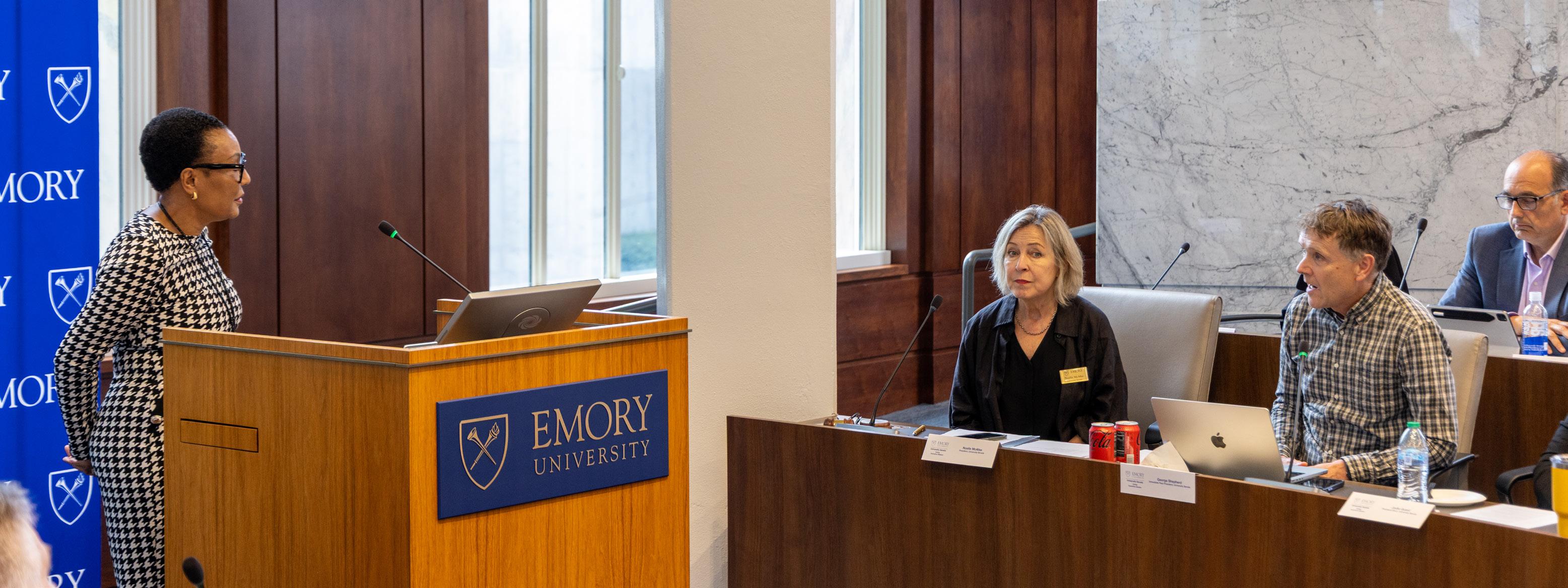
Sears discusses end of need-blind admissions, gives updates
By siya Kumar and JacK ruthErFord News Editor and Managing Editor
Content Warning: This article contains references to gun violence.
The University Senate returned for its first session of the Fall 2025 semester on Sept. 23. Emory Interim University President Leah Ward Sears (80L) addressed the University Senate and spoke about First Amendment violations in the Open Expression Policy and the end of need-blind admissions for the University. The meeting also included reflections from the Emory Police Department (EPD) about the Aug. 8 shooting at Emory Point. Contrary to the typical closeddoor policy of University Senate meetings, this convening was public to all community members through Zoom.
Sears gives first University Senate address
Sears began the meeting with a statement setting her goals and emphasizing her commitments as interim president. She said she would revive Emory’s Administrative Council, which would bring together university officials to report directly to Sears.
The interim president added she will remain committed to shared governance between faculty and administration.
“Shared governance, to me, isn’t just about a structure, it’s about a process,” Sears said. “It’s a commitment to collaboration, mutual respect and to our shared responsibility for the future of this great university.”
Sears also addressed the university’s decision to terminate Diversity, Equity and Inclusion (DEI) programs at Emory, sharing that the debate over
these closures had begun “months” before she took office.
“I know that that message raised many questions,” Sears said. “These conversations, debates and decisions began months before I took office, even months before I knew I would be here.”
Sears said she did not have a definition of what constituted a DEI program after being asked about the program cancellations by an audience member.
“I can’t say that yet,” Sears said. “It’s going to be a slow walk forward, so I can’t come here and put up a PowerPoint and tell you this is going to be in, and this is out. If we’re just going to, together, have to work through all of this, it’s just an unfolding thing.”
Sears also mentioned that the University can maintain affinity spaces as long as everyone is welcome.
See EPD, Page 3
Senate investigates termination of professor
By ElliE Fivas Editor-in-Chief
The University Senate Committee for Open Expression started an investigation into the termination of an Emory University School of Medicine faculty member on Sept. 18. Emory University terminated the professor due to social media posts that “caused concern” within the campus community, according to a statement from School of Medicine Dean Sandra Wong addressed to medical school staff.
The University did not confirm the identity of the terminated professor. However, School of Medicine Associate Professor Anna Kenney posted comments on Facebook regarding the recent assassination
of Charlie Kirk, a right-wing political figure, which garnered scrutiny from U.S. Rep. Derrick Van Orden (R-Wis.). The University removed Kenney’s faculty profile on the School of Medicine website.
Following the termination, University Senate President Noëlle McAfee authored an open letter on Sept. 18 requesting that the Committee for Open Expression Chair Sasha Volokh investigate the termination. The committee shared its preliminary opinion with the senate on Sept. 23, finding that the termination of the medical school professor likely violated the Open Expression Policy.
The opinion cited evidence of
Emory Writing Center removes DEI from its website, echoing University-wide trend
By irEnE John Oxford News Chair
In accordance with Emory University’s decision to end Diversity, Equity and Inclusion (DEI) programs, the Emory Writing Center (EWC) removed all DEI language and programming from its website on Sept. 4, echoing a broader national trend. Currently, academic institutions across the country are reevaluating their commitments to DEI amid federal opposition to these programs.
According to the EWC Director and Associate Teaching Professor Melissa Yang, concerns first arose regarding the EWC’s hiring practices in January 2025 when U.S. President Donald Trump took office and began issuing statements and executive orders in opposition to DEI. According to Yang, when the EWC hired staffers, it traditionally prioritized candidates who had experience with topics including anti-racism, equity and justice, which now, the University worries may not align with government policies.
Yang said that in a University deans meeting she attended in May 2025, the EWC’s website was flagged as “risky,” which led to changes in the equity statement.
“It was the day after the announcement went out that the DEI offices were dismantled, that I received
The EWC is a free service for a majority of Emory students as well as staff and faculty, offering guidance and support to writers. Until the beginning of this school year, its website and hiring page included DEIfocused statements. Now, those statements are gone, including a statement about the EWC’s commitment to anti-racism, equity and inclusion.
another call to say we also had to take down the equity statement,” Yang said.
Regarding how these changes have affected the center, Yang expressed her frustration about the new censorship.
“We spend a lot of time talking about the importance of language and empowering students through being able to guide them to feel empowered in their language use and their use of free expression,” Yang said. “It’s demoralizing that we are being censored while we’re trying to do this work.”
Business Librarian Saira Raza, who formerly served as the co-chair of Emory Libraries’ DEI committee, said the impact of scaling back on DEI initiatives may be harmful for students, especially those who may have viewed the EWC as a source of
community.
“When you are a person of color or a person from another country who’s visiting here and you’re going to get help outside of class, a lot of times it is very comforting and it can be such a huge difference to be helped by somebody who can relate to your experience, and even sometimes they just have those nuggets of information to give you that you just wouldn’t get elsewhere,” Raza said.
For some on campus, the removal of the EWC’s DEI statements felt symbolic of a larger transformation on campus.
Oxford College Library Head of Teaching Paige Crowl (17C), who served as Raza’s co-chair on the DEI committee, spoke of her disappointment in the institution’s dismissal of diversity-focused initiatives.
“Emory has capitulated in a large
way because they’re scared of the risks of standing up for some of these things,” Crowl said.
Crowl said she hopes that students still believe they can fight for these core principles of DEI, despite the University’s scaling back of support for DEI.
“I wish the administration would realize that a lot of students are feeling a sense of fear and despair right now, because it feels like this institution that a lot of us have placed our trust in is not willing to plant that flag and stand up for them and what they believe in and what they care about,” Crowl said.
Editor-in-Chief Spencer Friedland (26C) contributed to reporting.
— Contact Irene John at irene.john@emory.edu
Emory will not release Dean’s List going forward
By amElia Bush and JacoB muscolino Arts and Life Editor & News Editor
After achieving a 4.0 GPA for the Fall 2024 semester, Emory University notified Stella Harris (28C) of her Dean’s List distinction via email. She said she appreciated the recognition for her academic achievement. However, when Harris achieved the same feat in her second semester, she did not receive an email.
“I emailed my academic advisor … because summer was over and I still hadn’t gotten an email,” Harris said. “So I basically just emailed my academic advisor and was like, ‘Could you look into this for me? Do you know why I haven’t gotten an email about it yet?’ And she was basically just saying how it’s not happening at Emory anymore.”
Harris is one of many students whose academic achievements for this past semester in the Emory University College of Arts and Sciences (ECAS) will not be recognized by a Dean’s List distinction. Emory has not released a Dean’s List since the Fall 2024 semester, according to Associate Director of University Communications Rachel Smith.
However, Smith did note that beginning with the Spring 2025 semester, students can receive “Honors in Course recognition,” which will see ECAS award students for achievement based on cumulative GPA.”
Furthermore, Emory ended its participation in the first-year honor society Phi Eta Sigma. An email sent to Phi Eta Sigma members said

the University made the decision considering factors like “academic exploration, student well-being, and responsible stewardship of institutional resources.” However, Emory will still recognize students who have already been inducted to the Phi Eta Sigma at commencement through 2028, according to the email from the honors society.
“The emphasis on first-semester GPA alone does not fully align with Emory’s evolving approach to recognizing student excellence,” the email reads.
Outside of Emory, colleges nationwide have done away with the Dean’s List. Brown University (R.I.) has not had a Dean’s List since 1970, and Hamilton College (N.Y.), Cornell University (N.Y.) and the University of Pennsylvania abolished their Dean’s Lists in recent years.
Hamilton decided to cancel their dean’s list following rising grade inflation. While Emory has declined to comment on why they did not release a Dean’s List last semester, Emory has also seen a substantial rise in GPA. The average GPAs of ECAS graduates rose from 3.48 to 3.68 over the past five years. In 2025, over 72% of the graduating class had a GPA of over 3.5. Despite grade inflation, students are concerned that above-average performance in more difficult programs will go unrecognized without the Dean’s List.
Rachel Zwaig (28B), a finance major, said the grading curve in the Goizueta Business School makes business classes “more competitive.” Zwaig argued that earning a 4.0, or a high GPA altogether, in the business school is a unique achievement that is difficult to obtain. Unlike
ECAS, the Business School does still have it’s own Dean’s List and has not announced any plans to make a change.
Zwaig added that the Dean’s List helps future employers contextualize applicants’ performance.
“Having it, it does give students something to, not look forward to, but to know that if they’ve done well and they’ve earned it they can achieve something that has a little merit to put on your resume,” Zwaig said.
Will Needlman (28B) said Phi Eta Sigma members should have been given a say in the decision, because inductees into the honor society must pay dues for their membership.
Needlman echoed Zwaig’s mindset, sharing that making the Dean’s List in his first semester felt like an “accomplishment” for his effort in
the business school, considering the curve.
“Even if everyone’s a great student, not everyone can get an A, and I’ve seen the grade distribution in some of my other classes, so it was nice to see that, even though everyone here is really smart and competitive, I can still hold my own,” Needlman said.
Harris said that despite her disappointment in not receiving a spot on the Dean’s List for the past semester, the Dean’s List can create a “toxic environment” by summarizing the academic semester through one’s grade. However, Harris said the competition can push students to perform better in the classroom.
“It’s just creating an unnecessary hostile environment for students to try to compete with each other, but at the same time, I think it does set a standard to want to work harder for something,” Harris said. “At least when I first got it, it made me want to just work harder in the future.”
The Dean’s List and Phi Eta Sigma Honor Society have been a way for the University to recognize students for their academic achievements. While new developments are under way, such as the “Honors in Course recognition,” Harris said that ECAS’ Dean’s List was a way for high-performing students to be noticed for their hard work.
“[The Dean’s List] is a nice way to recognize people, and just a nice standard for if you do work hard, this is something you could be recognized for,” Harris said.
— Contact Amelia Bush at amelia.bush@emory.edu and Jacob Muscolino at jmuscol@emory.edu
Crime Report: Theft by deception, use of drug-related objects Graduate student union reaches bargaining agreement with Emory
By GEorGE sEGall Crime Desk
The Emory Wheel regularly meets with Emory Police Department (EPD) Records Manager Ed Shoemaker (87G, 90G) and Communications Director of Campus Safety Morieka Johnson (94C, 24L) and uses EPD’s public crime log to inform the Emory University community about recent crime on and around Emory’s campuses.
To report a crime, contact EPD at 404-727-6111 or police@emory.edu.
Theft by deception at Cox Hall
A student in Cox Hall Market contacted EPD at about 6:40 p.m. on Sept. 19 about a theft by deception that occurred the day prior, on Sept. 18. On the morning of Sept. 18, a female subject posted an advertisement in a GroupMe channel for the sale of a red 2014 Honda Accord. The student victim messaged the subject and asked if the vehicle was still available for purchase, to which the subject said it was.
The subject sent the victim details, including a CARFAX report, and asked if the victim was available to see the vehicle in person. The victim said they could come see the car over the weekend, but the subject said she would not be available then. The subject said that if the student sent a deposit between $200 and $500, she would not offer the car to anyone else.
The victim sent $250 via Zelle to the number the subject provided at approximately 10:00 a.m. on Sept. 18. The subject sent a message back, stating that another potential buyer offered a $500 deposit and that the owner of the vehicle, an individual different from the subject, would prioritize the highest offer. The subject then sent the victim a screenshot of
a text message that appeared to show the other buyer sending $500. Then the subject asked if the victim could send additional money, which the victim agreed to and sent another $250 via Venmo about 30 minutes later.
The subject later requested another $1,000, claiming the other potential buyer was offering a deposit of $1,500. It was at this point that the victim requested a refund, which the subject said she could issue in a day or two. The subject sent a screenshot indicating that $500 had been returned. The victim told the subject they never received the refund, and the subject told the victim to check their spam email folder.
At about 6:30 p.m. on Sept. 19, the victim attempted to contact the subject again, requesting a refund, and the subject declined. The victim then contacted EPD, who are currently investigating the case.EPD said University community members should exercise extra caution when dealing with third-party online advertisers.
Possession and use of drug-related objects at ATO
EPD responded to a call at 12 Eagle Row, the house of Alpha Tau Omega fraternity, from its graduate housing director on Sept. 19 at about 10:00 p.m. The director was conducting her routine rounds and entered the house to inspect the building. When she entered the house, she observed three unidentified male subjects sitting in the living room, one of whom was actively smoking from a clear glass bong.
The director approached the men and asked for their student ID numbers. The men responded that they are not Emory students, and the student smoking said that they were actually a student at “Georgia Technical College.” The director then attempted to ask for the men’s names,
but they refused to identify themselves and proceeded to leave the room.
The director called EPD at this point, but EPD could not locate the men. Additionally, EPD said the descriptions the director provided were generic, so it would be unlikely for EPD to be able to locate and identify the three men. EPD retrieved and confiscated the glass bong, turning it into the department as contraband. EPD will continue to investigate the case.
Terroristic threats at EUH
A visitor at Emory University Hospital (EUH), who is the child of a patient, contacted EPD while at EUH at approximately 7:30 p.m. on September 22. The visitor stated that she received a phone call from her aunt, who resides in LaGrange, Ga. The aunt told the victim that the victim’s sister had made concerning statements about the victim, specifically telling the aunt someone was going to die that night and that the sister was going to kill somebody, according to EPD.
The aunt interpreted these statements as potential threats toward the victim. The victim’s sister was alleged to be upset with the victim for not keeping her informed about their mother’s condition. The victim also believes that her sister’s boyfriend, who was just released from prison, is negatively influencing her sister.
At the time of the report, the victim did not know whether her sister had any weapons in her possession, but she said she wanted to alert EPD of the situation in case anything were to occur at EUH. The victim also provided EPD with photographs of her sister and her sister’s boyfriend so EPD could identify them.
— Contact George Segall at george.segall@emory.edu
By laurEn yEE Managing Editor
When the National Labor Relations Board (NLRB) certified EmoryUnite! as a union in 2023, federal law obligated Emory University administration to enter into negotiations with the graduate student union. After two years of negotiations, Emory and EmoryUnite! ratified their first Collective Bargaining Agreement earlier this month, establishing the terms and conditions of work for graduate students in the Laney Graduate School.
The agreement establishes new pay rates, increased benefits and standards of working hours for students. The new terms went into effect immediately and will remain in place until Aug. 24, 2027.
A Sept. 19 EmoryUnite! press release emphasized that the contract “marks a historic win for organized labor at Emory.” This is the University’s first and only union contract, according to EmoryUnite! Incoming co-chair Tasfia Jahangir (23PH, 29G).
“Our journey to this first contract started a decade ago with a small group of Emory grad students who had a vision for a better future,” Jahangir said.
Under the preliminary Memorandum of Agreement, all graduate students will have a minimum annual stipend of $42,000, compared to $36,000 at the beginning of Spring 2024. The memorandum was published before finalizing the Collective Bargaining Agreement.
Additionally, students will have access to three separate pools of funding to assist with childcare, dependent care, international activities, medical needs, financial hardships and medical insurance for students on leaves of absence. Emory will distribute these funds, and they will be awarded on a
first-come, first-served basis, according to Jahangir. Within their five years of guaranteed funding at Laney, graduate students may each also receive up to $7,500 in professional development support from the University.
The press release states that the union had 30 bargaining sessions with the University over the last two years. The union has been in negotiations with the University since April 2024, according to EmoryUnite! treasurer David Meer (26G). Union members ratified the contract with a 97% vote, according to a Sept. 12 post.
EmoryUnite! Bargaining Committee co-lead Madelyn Carlson (29G) wrote that the agreement reflects PhD students’ efforts.
“Securing our first contract is a major win that can be attributed to the hard work of the PhD student body, who have consistently advocated for more stability and security in our jobs,” Carlson wrote.
In a memo to Emory faculty, Interim Provost Lanny Liebeskind and Laney Graduate School Dean Kimberly Arriola wrote that Emory hopes to continue working with SEIU Southern Region.
“We thank all our faculty and staff for their ongoing support of our PhD student community as we continue to pursue excellence in graduate education, teaching and research,” Liebeskind and Arriola wrote. Liebeskind and Arriola wrote that they look forward to implementing the agreement.
“We are pleased to have reached an agreement that reflects a shared commitment to top-quality graduate education and an Emory experience that fosters success,” Liebeskind and Arriola wrote.
— Contact Lauren Yee at lauren.yee2@emory.edu
Faculty members discuss free speech concerns
Continued from Page 1
violations of the University’s Open Expression Policy, including clauses protecting community members’ First Amendment rights and the University’s adherence to federal law. It criticized Emory’s decision to terminate the professor by claiming the firing was the “sort of viewpoint discrimination that the Open Expression Policy expressly rejects.” The preliminary statement also argued that the Open Expression Policy requires the University to respect employees’ speech outside of work, including social media comments.
“All members of the Emory Community have broad latitude to speak, write, listen, challenge, and learn, whether they are on or off campus,” the policy states. “These freedoms are limited to the extent necessary to protect significant university interests enumerated above, and any regulations should not discriminate with respect to viewpoint or content.”
During a Q&A following Interim University President Leah Ward Sears’s (80L) address at the Sept. 23 University Senate meeting, University Senate Past-President and Professor of Law George Shepherd asked the president about the termination. At this point, the senate had already published Volokh’s preliminary investigation.
“I was kind of stunned when the med school dean fired somebody for words on their private account,” Shepherd said. “It was grotesquely offensive words, but still words, and that would seem that the firing of this person would seem clearly to violate the policy and the open expression committee has confirmed that.”
Sears said she believed it was “totally inappropriate to offer a reason” for the faculty member’s termination.
In March, Emory announced an updated Open Expression Policy. The University Senate and the University administration collaborated to implement changes to the policy.
However, in an interview with The Emory Wheel, McAfee raised concerns about the University’s actions toward the terminated professor, especially in the wake of the collaborative Open Expression Policy revisions.
“The Senate holds out an invitation for the administration to join us in protecting our principles and our policies.”
— Noëlle McAfee
“[The University] got the perfect policy that they wanted, that they can use, and now they’re showing that they’ll completely disregard it when it’s inconvenient,” McAfee said. “This is such bad faith. It gives me very little confidence that this University is going to protect people. It will continue to punish people when their expressive activity is inconvenient.”
While Volokh’s preliminary investigation stated the termination was against Emory’s policy, the committee also emphasized the findings were tentative and that the Committee for Open Expression is working on a full report to further investigate the medical professor’s termination.
After the senate meeting, McAfee told the Wheel that she wants the Emory administration to demonstrate further commitment to its Open Expression Policy.
“The Senate holds out an invitation for the administration to join
us in protecting our principles and our policies,” McAfee said. “We are still waiting for them to accept that invitation.”
If the full investigation finds the University violated policy with the termination, Volokh said the ideal remedy would be for the University to reinstate the fired professor. However, he also said that because the University Senate is an advisory body, the committee cannot compel Emory administration to change any decisions.
“Anybody who is fired contrary to the policy should be unfired,” Volokh said. “The Committee for Open Expression has no power to force that to happen, but our hope is that Emory will recognize its obligations under the policy.”
Volokh shared a quotation from a 1996 court case in which Sears authored a concurring opinion in a First Amendment case. He shared his hopes that Sears will abide by these values during her time leading Emory.
“In fact, we must do our very best to hold fast to the values embodied by the First Amendment, even in extreme and painful cases, because we cannot suspend it and remain all that we strive to be,” Sears wrote.
Volokh was optimistic that Sears continues to stand by open expression protections in her role as University president.
“My hope is that President Sears, who herself is a former justice of the Supreme Court [of Georgia], and has said very positive things about free speech and the First Amendment during her judicial career, is ultimately going to come down as she should, on the side of free speech,” Volokh said.
— Contact Ellie Fivas at ellie.fivas@emory.edu
Continued from Page 1
Need-blind admissions come to an end
During the meeting, Sears announced the end of need-blind admissions at the Atlanta campus.
The University’s need-blind admission policy meant that the admission committee would not consider an applicant’s financial status when making admission decisions. The Atlanta campus will now switch to a need-aware policy, which means they will consider an applicant’s financial status during admission. Already, Oxford College uses a need-aware policy during its admissions process.
Emory began its need-blind admissions policy in 1998 when it joined the 568 Presidents Group, a consortium of American universities and colleges that practice need-blind admissions. The 568 Presidents Group also created the Consensus Approach method to standardize a university’s ability to calculate an applicant’s family’s ability to pay tuition.
EPD updates in wake of CDC shooting
After Sears’ address, EPD updated the University Senate about their initial response to the CDC shooting on
Aug. 8.
EPD Chief Burt Buchtinec said the University could not have predicted the shooting, and the police department is doing its best to address additional safety concerns.
Buchtinec also mentioned that EPD is working to increase multi-agency response communications during police emergencies.
“When the incident occurred on August 8, I could immediately get on the phone with City of Atlanta Chief of Police and say, ‘We need X,’” Buchtinec said. “He did not hesitate. He said, ‘Absolutely, we’re on the way.’”
Buchtinec mentioned that EPD was considering increasing its presence on campus, especially in crisis intervention, first aid and tactical training.
— Contact Jack Rutherford at jack.rutherford@emory.edu and Siya Kumar at siya.kumar2@emory.edu
If you or someone you know is struggling in the aftermath of gun violence, you can reach Emory’s Counseling and Psychological Services at (404) 727-7450 or the Substance Abuse and Mental Health Services Administration Disaster Distress hotline 24/7 at +1 (800) 985-5990.
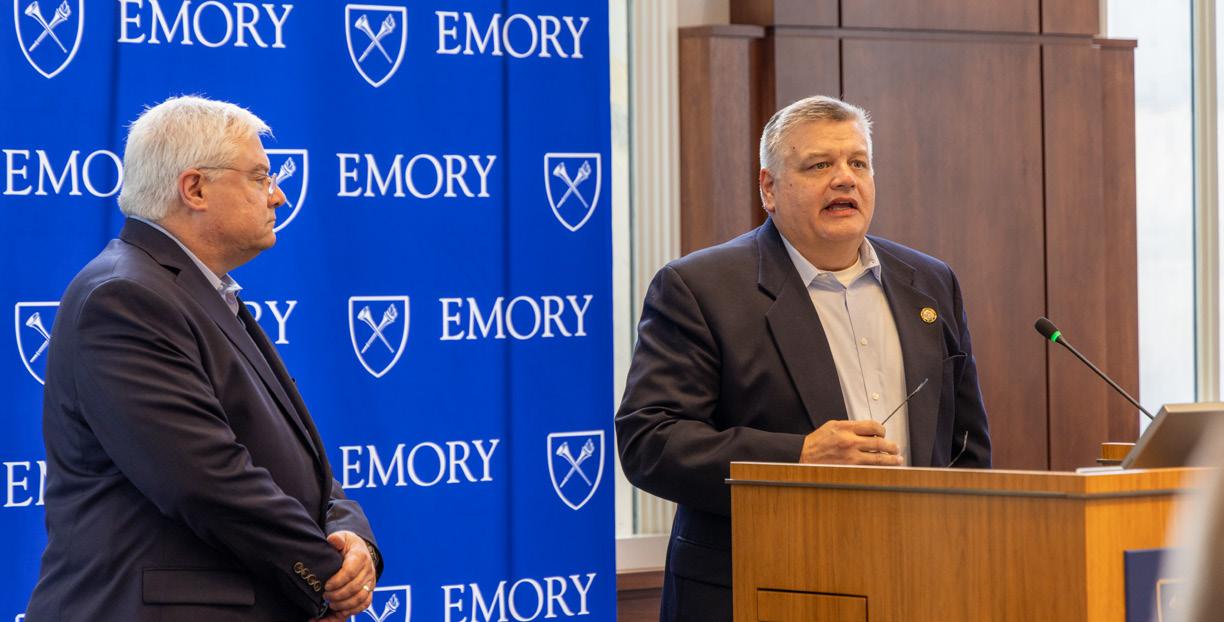
FIRE gives Emory D- ranking in 2026 College Free Speech Rankings
By KathErinE momBo Contributing Writer
The Foundation for Individual Rights and Expression (FIRE) has ranked Emory University No. 67 out of 257 U.S. colleges in the 2026 College Free Speech Rankings. Emory’s ranking soared up by 87 spots from 2025, with its score rising from 44.07 to 61.3 out of 100. FIRE also gave the University’s policies a “green light” rating, indicating that the school's policies do not seriously threaten free speech.
The FIRE rankings assess colleges’ commitment to upholding free speech by conducting student surveys, reviewing campus policies and analyzing speech-related controversies. FIRE's sixth annual report included survey responses from 68,510 students nationwide about their comfort expressing dissent, tolerance of controversial speakers and self-censorship around peers and faculty.
The survey results displayed mixed opinions about how comfortable students felt expressing their
The Emory Wheel
Volume 106, Issue 10 © 2025 The Emory Wheel
Alumni Memorial University Center, Room 401 630 Means Drive, Atlanta, GA, 30322 Business (404) 727-6178
Editors-in-Chief Ellie Fivas and Spencer Friedland ellie.fivas@emory.edu spencer.friedland@emory.edu
Founded in 1919, The Emory Wheel is the financially and editorially independent, student-run newspaper of Emory University in Atlanta. The Wheel is a member publication of Media Council, Emory’s organization of student publications. The Wheel reserves the rights to all content as it appears in these pages, and permission to reproduce material must be granted by the editor-in-chief.
The statements and opinions expressed in the Wheel are those of the authors and do not necessarily reflect those of the Wheel Editorial Board or of Emory University, its faculty, staff or administration. The Wheel is also available online at www.emorywheel.com.
views. Of the 281 Emory students who responded to the survey, 41% reported self-censoring in conversations with other students on campus at least once a month and 19% reported self-censoring at least twice in a week.
The Emory student respondents were also largely opposed to controversial speech on campus. Of the Emory students surveyed, 32% said it is acceptable to shout down a speaker to prevent them from speaking, with another 39% of respondents who reported that it was acceptable in rare cases. Another question revealed that 14% of Emory students believe it is sometimes acceptable to use violence to prevent a person from speaking, and a further 16% think it is rarely acceptable.
Professor of Law and University Senate Committee for Open Expression Chair Sasha Volokh said that student self-censorship can be harmful if it inhibits general discussion at Emory.
“It’s not necessarily, as such, wrong for people to feel that they need to self-censor, but it is a problem if overall it means that you don’t have the robust discussion on campuses, which you should,” Volokh said. “If anything, universities are the top place where that ought to be happening.”
In recent years, the University has been the subject of various free speech debates. In April 2024, police
arrested 28 people, including 20 Emory community members, during pro-Palestine protests on the Quadrangle. FIRE has also been involved in a free speech controversy when in April 2025, the organization sent a letter to former University President and current Chancellor Gregory Fenves on behalf of Kappa Sigma, demanding that the university lift its ban on the fraternity’s social functions and chapter meetings.
Emory announced an updated Open Expression Policy in March that outlined content-neutral boundaries related to the time and place in which demonstrations can occur.
The new policy upholds that Emory community members and visitors have the same rights under the policy. These clarifications were designed to balance community members’ rights to expression with campus safety.
University Senate President and Chair of the Philosophy Department Noëlle McAfee emphasized the importance of fostering a University environment that does not punish free speech.
“We need to call out and call on our University leaders to be able to listen and tolerate and not succumb to political pressure,” McAfee said.
FIRE’s report also noted that Emory has not adopted the Chicago Statement for free speech or officially committed to institutional neutrality. Both are clauses that affirm a
university’s support for the rights to all speech and have been adopted by peer institutions including Vanderbilt University, Johns Hopkins University and Northwestern University.
Raleigh Maxwell (28C), treasurer of Young Democrats of Emory, noted that students involved in campus organizations may suppress speech to avoid losing key resources.
“A registered student organization is reliant on the school for things like funding, for even being chartered,” Maxwell said. “The students who are members of those organizations can sometimes feel more reluctant to exercise fully their free speech.”
Maxwell reiterated that student perception of free speech may improve if the University further communicates with students about the Open Expression Policy.
“The best way the University can apply their rules and communicate their rules better is always involving the students,” Maxwell said. “It always needs to involve lots of communication with the students, not just emails.”
Looking forward, McAfee expressed hope that the University will do more to ensure students feel comfortable expressing their views.
“We have an excellent policy, and we should probably, as a community, learn how to live up to it,” McAfee said.
— Contact Katherine Mombo at katherine.mombo@emory.edu
Learn from Kirk's complicated legacy
By Mira kriChavsky, niki
raJani anD Josh rosenBLUt staff Writers
Content Warning: This article contains references to gun violence.
Emory University terminated a medical school professor who outwardly cheered on the death of Charlie Kirk, a 31-year-old conservative activist assassinated on a college campus in broad daylight, on Sept. 18. The celebration of his death by this professor, which was also echoed across the United States, is as corrosive as the assassination itself.
This fervor confirms that political violence is not just normalized in the United States — it is being excused and even cheered. Instead of rushing to celebrate Kirk’s death, everyone should be alarmed and condemn this political violence: This is the first step in learning from Kirk’s complicated legacy.
Kirk’s legacy as the co-founder of the conservative student organization Turning Point USA shows the power of direct demonstration and open debate. His rhetoric was exclusionary and vilifying of immigrants, LGBTQ+ communities and those who disagreed with him, but his willingness to meet young people face-toface energized audiences in a way that cannot be ignored.
In the wake of his assassination, as students and professors on our campus celebrated violence rather than engaging in open dialogue, his tactics revealed a harder truth: Engagement, however flawed, is still more democratic than silence or bloodshed.
Kirk’s greatest strength was his presence. He showed up at campus buildings, in auditoriums and on students’ social media feeds. By meeting people where they were, he spread his message of conservative activism.

Just like in college life, in politics, students are drawn to those who engage and listen, even as flawed as the rhetoric may be.
Kirk’s debate style embodied the belief that politics should be discussed in person and out in the open, not left to the curated echo chambers of algorithm-driven feeds. His one-onone campus debates, which circulated widely online, invited confrontation, sharp disagreement and the ability to pivot arguments quickly in response to challengers. Kirk maintained control of heated live exchanges with his relentless confidence, and he used long-form conversations on his podcast to build familiarity among audiences.
At live events, he drew students in by pausing for reaction, building tension, and asking leading questions that forced his challengers to defend
eLLie Fivas editor-in-Chief
Siya Kumar News Editor
Jacob Muscolino News Editor
Carly Aikens Editorial Board Editor
Ethan Jacobs Opinion Editor
Cayden Xia Opinion Editor
Hunter Buchheit A&L Editor
Amelia Bush A&L Editor
University, Atlanta, GA, 30322.
their reasoning, a tactic that was manipulative but undeniably effective.
Despite using persuasive rhetorical strategies, Kirk’s reliance on anecdotes and rephrased questions often distorted facts, turning dialogue into a performance that looked like engagement but left little room for real dissent.
While these tactics limited genuine dialogue, they nonetheless proved effective in shaping political culture. His methods of direct communication and populist rhetoric influenced the masses and led to a large increase in confidence among young conservatives on college campuses.
Kirk’s political strategy’s capacity for mass mobilization demonstrates the immense potential for political influence gone unutilized in the digital era. While we do not want to romanticize his legacy, we must acknowledge
spenCer FrieDLanD editor-in-Chief
MaDeLine shapiro exeCutive editor
Catherine gooDMan Managing editor
WiLL peCk Managing editor
WenDy peLayo Managing editor
JaCk rUtherForD Managing editor
LaUren yee Managing editor
Sammy Brodsky Sports Editor
Chloe Nam Sports Editor
Ivana Chen Illustration Editor
Sasha Emmerich Deputy Illus. Editor
Saba Faisal Deputy Illus. Editor
Sage Buchris Deputy Photo Editor
Jack Sutton Deputy Photo Editor
ivan Wang | Business Manager Business/Advertising Email emorywheelbusiness@gmail.com
Esther Fu Social Editor
Clément Lee Senior Editor
Alex Gerson Deputy Editor
Angela Chan Copy Chief
Disha Kumar Senior Copy Editor
Malia Yap Copy Editor
Aimee Zhang Copy Editor
the way he built community by showing up and speaking frankly — presence and direct engagement like Kirk’s are powerful tools that need to be redirected toward more constructive ends.
If Kirk’s tactics showed the power of showing up, the reception across our campus and the country to his assassination shows the danger of what happens when violence replaces dialogue.
The reaction from various professors, public figures and students demonstrates the disturbing nature of this divisive political era. Posts on X and live comments openly lauding his assassination highlight how easily political violence can be normalized — a response misaligned with our values as students and as members of a democratic society.
Those who call for stronger gun regulations and denounce political violence cannot, without hypocrisy, celebrate Kirk’s assassination.
Selective outrage condemning mass shootings in Buffalo, N.Y., Uvalde, Texas, or Parkland, Fla., that condones the actions of an assassin based on ideology only deepens the vitriol of political violence in America.
Our democracy should be built upon freedom of speech and equitable disagreement without fear of violence.
Kirk’s death, which comes amid toxic polarization, makes clear the need to reevaluate the depths of U.S. political fissures.
While ideological diversity is a hallmark of democracy, both sides of this growing divide must ultimately reside on the same team, that of the American project: a commitment to free speech, equality and the rule of law. If we cannot unite around rejecting violence as a tool of politics, then the bedrock of our nation crumbles.
The lesson for Emory students, and for anyone who wants to shape the
future, is simple: Political organizing requires presence and purpose. For Emory activists working on causes like voter registration or gun safety legislation, Kirk’s career suggests there is no substitute for the power of face-to-face persuasion. Political mobilization requires communication that steps beyond social media or the safe zone of a private group chat. Kirk’s content should not be our model, but his tactics should be.
We must also reject violence at every turn. At Emory, an institution meant for learning, not violence, we should know better. Our role is not to cheer death but to uphold the difficult and often frustrating work of constructive dialogue.
If we cannot do that here in a community built for inquiry and debate, then there is little hope for the politics future generations will inherit. As Emory’s own vision reminds us, we are called to be an “inquiry-driven, ethically engaged, and diverse community.” As students, we cannot just quote that vision. We have to live by it or we lose the very purpose of being here.
Originally intended for the Editorial Board, this piece reflects the opinion of the following three Editorial Board writers.
If you or someone you know is struggling in the aftermath of gun violence, you can reach Emory’s Counseling and Psychological Services at (404) 727-7450 or the Substance Abuse and Mental Health Services Administration Disaster Distress hotline 24/7 at +1 (800) 985-5990.
— Contact Mira Krichavsky, Niki Rajani and Josh Rosenblut at mira.krichavsky@emory.edu, niki.rajani@emory.edu and josh. rosenblut@emory.edu

'Good deals' for Trump are bad for Americans
By pierCe MCDaDe staff Writer
President Donald Trump has always been known for being a master in the “art of the deal.” In the past month, his reputation has become more evident than ever, following the federal government’s unprecedented steps into the business world. In August, the president made a deal with the chip giants NVIDIA and AMD, allowing them to sell their high-tech chips to China in exchange for a 15% cut of the companies’ chip profits. The following week, Intel announced that the existing government investment in the company would be used to purchase a 9.9% stake at a discount from the market price. These deals are some of the most recent in a growing list of government interventions into the private market.
These deals have sent shockwaves throughout the worlds of politics and business. While many Republicans have stayed silent on the topic, leftwing politicians like Sen. Bernie Sanders (I-Vt.) have praised Trump for returning profits from corporations back to citizens. Some rightwing politicians have even compared the move toward government ownership of private corporations to socialism. With Trump pledging “many more” deals with major corporations to come, it is clear that a major restructuring of American capitalism is underway. Now, and in the future, Trump’s business deals will fracture the relationship between the government, corporations and the public, and mechanisms already exist to address the problems he is trying to solve.
In April, Trump barred the sale of high-tech chips to China for national security concerns. However, the deal Trump brokered with NVIDIA and other industry leaders in August reaps profit from sales to China and bypasses this barrier, while speaking nothing to the validity of the national security concerns. The federal gov ernment has not made any substan tive changes to the national security landscape between the United States and China regarding chips since April, so it does not make sense that these restrictions were lifted. Either the barring of chip sales to China was an overcautious error by the United States, or it stemmed from valid concerns that still exist but are now being ignored.
stance is the case, this new deal sets two dangerous prec edents. Firstly, this deal allows the government to extort con cessions from companies, like the 15% cut from NVIDIA chip sales, by plac ing and then lifting export restrictions on the prod ucts they sell, in exchange
for a cut of their overseas profits. Additionally, it encourages companies facing export restrictions to make deals with the government to lift those regulations, no matter the underlying cause. These precedents are dangerous for American business and national security because they take the focus away from national security and onto government profit, a precarious shift for the American economy and American capitalism.
The conception of the Intel deal was quite different from that of NVIDIA and AMD, but it was decidedly even more dangerous. At the beginning of August, Trump held a meeting with the Intel CEO Lip-Bu Tan to address a conservative-fueled controversy related to his relations with China. However, the meeting gave grounds to Trump’s larger concerns about the return on the $11.1 billion investment the Biden administration made into the company.
Trump thought that Americans and the American economy were not getting a high enough return on their investment, and brought these concerns to Lip-Bu Tan in their meeting.
Despite lambasting the personal allegations about business connections to China as false, Tan and his company still gave up 9.9% of the company’s shares to the federal government as a way to tamper political pressure and avoid government sanctions. This sets a dangerous precedent for the future, in which Trump or other administrations can directly interfere with business affairs by extorting companies that do not fall in line with their views. While the government has long invested in American companies, previous investments have come with benchmarks and strings attached, like requirements to build with American materials and labor, but not a direct stake in the companies A direct stake, on the
this justification in valid cases and work with companies looking to sell products overseas, rather than simply demanding a quid pro quo and allowing this foreign trade with little oversight. Additionally, to address concerns related to the return on investment (ROI) of government funding for businesses — as in the case of Intel — Trump should remember that investment in American economies should come through job creation, infrastructure investment and the multiplier effect. Following the acquisition of direct stakes in companies like Intel, he has made these outcomes less likely through the removal of benchmarks tied to the original investment, like the requirement to build in America and meet job creation requirements. Even if benchmarks alone are not enough for the government to recoup a ROI from the original terms of the deal, Trump could have used other established mechanisms, like raising the corporate tax rate or increasing regulation, rather than making an unusual and harmful deal that threatens to destabilize American capitalism.
As deals like these become more prevalent, it is imperative that we return to the basics and analyze these deals and their effects. Many Emory University community members are voters in Georgia, a consequential state in elections, and we must do our research and understand how Trump’s actions impact our economy and its future. We must research how our elected officials feel about these actions, and use our vote and voices accordingly, electing lawmakers who will act in our best interest and in the interest of our economy’s future.
These two deals will almost certainly not be the last under the Trump administration. Alongside his tariff regime, changes in diversity, equity and
Together, let's rethink Health 100
By JoshUa gLazer ContriButing Writer
At 5:30 p.m., entering the dark and eerie first floor of Emory University’s Tarbutton Hall feels like a chore. Around 20 freshmen pile into room 111, knowing a late arrival of more than five minutes is a 15-point penalty on their attendance grade.
Once class promptly begins, we stash our phones away — even a quick glance can earn another deduction. The students watch the clock ticking on the wall like a boiling tea kettle as they sit through a dry lecture on embracing the elements of well-being.
When I asked two of my friends how they would describe Health 100, they responded with “depression” and “dead.” It is no surprise this class has a bad reputation among Emory first-years. For many of us, Health 100 is just another requirement that coincidentally meets at the worst times – for some students, it is their only Friday class.
Even though the class may be dull and painful to sit through, the topics it covers are essential for a healthier campus culture. With depression and mental health issues surging among college students, especially college first-years, improving the Health 100 experience is a necessity.
As its syllabus states, Health 100 is a mandatory course in the fall, seeking to “engage, educate, encourage, and empower firstyear students in their health and well-being.”
This semester, a friend and I ate piping-hot waffles and smotheredand-covered hashbrowns while we opened up about personal, deep, uncomfortable conversations.
We talked about hate. We talked about dying. We talked about people close to us who hated themselves so much that they thought the only solution was to end their lives. We talked about how hard it is to find love — love for others and love for who you truly are.
Do not wait for Health 100 or the weekend to check in on your peers and you loved ones.
These conversations should not just happen in Waffle House parking lots. Health 100 should create space for these conversations, but it does not. At least, not yet.
To Emory administrators and Peer Health Partners, I offer a few ideas. Students would benefit from more storytelling in class and fewer PowerPoints — we sit through enough lectures already.
dramatic pushback, these shifts
ers, citizens and participants in the American economy, must continue to stay vigilant and hope that these unprecedented moves do not tank our
Contact Pierce McDade at pmcdade@emory.edu

Each week covers a different health topic area, ranging from elements of well-being to finding purpose in life. The class combines lectures and peer discussions, yet in practice, many students tune out, preferring to whisper about homework and weekend plans.
Even though the class may be dull and painful to sit through, the topics it covers are essential for a healthier campus culture.
In every Health 100 class, many students are likely struggling with their own mental health problems. In college, this might include stress, addictions, lack of sleep, eating disorders or self-consciousness – the list goes on.
This is not just speculation: According to a Substance Abuse and Mental Health Services Administration study, 1 in 3 people between the ages of 18 and 25 experience a mental, behavioral or emotional health issue.
Numbers only tell part of the story. Everyone needs an outlet to have important life discussions. And, let’s be honest: we are not having serious conversations about mental wellness in Health 100. For me, they happen at 2 a.m., sitting in a Waffle House parking lot.
Having upperclassmen instructors share their own experiences instead of reading formulaic slides will help us overcome the same stressors we are bound to encounter. Restructuring the syllabus to reward participation, effort and honest reflection instead of relying on infractions and penalties will encourage students to actually contribute to conversations. Discussing material that connects to campus life and current events would feel timely, and students would be more inclined to listen if they knew their voices and experiences mattered in conversation.
Above all, Health 100 should be a safe space for students to share their emotions and stories and understand that they are not alone. Freshman year is hard. It is chaotic and stressful both socially and academically, and Health 100 must do a better job of addressing this with real-world examples.
To my fellow first-years, I also have some advice. Do not wait for Health 100 or the weekend to check in on your peers and loved ones. Ask how they are doing today. Do not romanticize being busy — sometimes saying no is the healthiest choice. It is okay to not be friends with everyone, but treat your peers with the kindness and respect they deserve. Put your phone down at dinner and actually talk. Lastly, at least give Health 100 a chance.
Our time here is short. Forty-five minutes in room 111 can feel like years. But, before we know it, our four years will be gone.
Let’s not waste this precious time and remember that life as an Emory student is a privilege as much as a responsibility. We must learn, grow and care for one another while we are here.
The Emory Wheel Arts Life
Staff Picks: Our songs from summer
By arts & lifE staff
Summer is over, whether the Atlanta weather gods concur or not. Monday, Sept. 22 marked the first official day of fall, ushering in the season of burgundy leaves, pumpkin spice lattes and scary movies. But while the seasons change, some things never do, and the desire to dub a “song of the summer” is among them.
This year, the hunt for a summer anthem gave way to heated debate. Was it Sabrina Carpenter’s spunky Southern hit “Manchild”? Was it newcomer Alex Warren’s sentimental ballad “Ordinary”? Did summer 2025 lack an essential track? To settle this contentious issue, the Arts & Life staff — obviously, the definitive voice on the matter — offers our songs of the summer.
‘Slipfast’ by Role Model (2024)
It is no secret that summer 2025 served as a breakthrough season for the alternative-rocker-turned-indie star, Tucker Pillsbury. During almost a decade in the industry, Role Model achieved varied success as a hip-hop artist until his 2025 release, “Kansas Anymore (The Longest Goodbye),” catapulted him into the alt-pop stratosphere alongside Gracie Abrams, Lizzy McAlpine and Djo. This year, Role Model’s track “Sally, When the Wine Runs Out” became his first No. 1 on the Billboard chart.
But while the masses were dancing to the infectious chorus of “Sally,” I was screaming to the desperate bridge of “Slipfast.” A standout track from the original release of “Kansas Anymore” (2024), “Slipfast” finds Role Model arriving at his now highly regarded artistic persona — a candid songwriter, unassuming vocalist and self-aware self-saboteur. With “Slipfast,” a fusion of folk, rock and pop, Role Model captures the moment of calm before collapse and the cognitive dissonance of life in your twenties. On the aforementioned bridge, Role Model pines, “And sometimes I hate this road that I’m taking / I could just move home, no occupation / Throw in the towel, answer to no one / Just let it all burn down.”
Although “Slipfast” lacks the common features of previous summer hits such as the clever quips of Sabrina Carpenter’s “Espresso” (2024), it nonetheless speaks to a relatable aspect of summertime — watching the world from the window and wondering what the next season might bring.
— Catherine Goodman, Managing Editor
‘BOOGIE’ by BROCKHAMPTON (2017)
Summer, no matter the year, will always be BROCKHAMPTON season for me. I got my driver’s license just before the summer of 2021, and through those three months, my best friend Ben and I drove around for hours on end, enjoying our newfound independence. The soundtrack to those car rides was almost exclusively BROCKHAMPTON, especially since we no longer had to worry about our parents picking the music or having to play it at an appropriate volume.
BROCKHAMPTON, the eight-man rap group who sometimes refer to themselves as the “best boy band since One Direction,” might not always

make the most profound music, but you would be hard-pressed to find a group that infuses their tracks with as much unabashed fun and originality. “BOOGIE,” the intro song to the third album in the band’s “SATURATION” series, is the epitome of BROCKHAMPTON.
The song’s blaring horns, which have more in common with an ambulance than an actual instrument, are simultaneously groovy and speaker-breaking. The track also serves as a victory lap for the members of BROCKHAMPTON, who trade bars that sound like they are yelling from the zenith of the rap world. “I’ve been beat up my whole life / I’ve been shot down, kicked down twice / Ain’t no stoppin’ me tonight / I’ma get all the things I like,” Kevin Abstract yells in the song’s chorus. While BROCKHAMPTON’s time together did not last long, I will always associate their infectious energy with the freedom that summer brings.
—Alex Gerson, Deputy Editor ‘Just Keep Watching’ by Tate McRae
For me, the song of the summer is always one you can picture yourself playing while driving down to the beach with the windows down — it is a song that makes you crave running through ocean waves and falling in love in the heated night. In “Just Keep Watching,” which debuted on the “F1: The Movie” soundtrack, Tate McRae drives up to the listener in a racecar and promises a wild two-minute and 22-second ride that encapsulates this summer vibe.
Taking inspiration from the film this single debuted on, McRae evokes speed and physicality through percussion roars and synth pulses that gain momentum as she sings about confidence in the face of skepticism: “Just like this, here for the night / You ain’t buying in? Just keep watchin’.”
McRae tells us to own scrutiny and to revel in being watched. The music video is empowering, as the singer dances to the camera with a defiant sensuality that is certain to outrage the conservative political and social climate that has defined summer 2025. There is no song better to let your hair down to, to dance it out to in front of a sunset with people who let
CAMPUS
Actor Paterson Joseph unveils history, discusses debut novel
By EvangalinE Park Contributing Writer
On the left stood a rack of various shirts and jackets, at the center, a stool with books scattered around and on the right a lone, empty easel. Intrigue increased as members of the Emory University community and beyond gathered on Sept. 18, at the Cherry Logan Emerson Concert Hall for an evening with actor Paterson Joseph as he unveiled the secret history of Charles Ignatius Sancho.
Sancho, an enslaved man turned writer, composer and playwright made history as one of the first Black British men to vote, yet his name and legacy are not well known. After learning about Sancho, Joseph worked to publicize the writer’s story through the written and performing arts.
you give “all your love.”
Perhaps because she was the winner of “Song of the Summer” at the 2025 Video Music Awards, or even because she earned her third No. 1 song on Billboard’s Hot Dance/Pop Songs chart, it is not outrageous to say this single defined summer 2025. You don’t believe in McRae? Well, you will have to “Just Keep Watching,” then.
– Jacob Muscolino, News Editor ‘the 1’ by Taylor Swift (2020)
No one does summer better than Taylor Swift — especially with her Grammy award-winning Album of the Year, “folklore” (2020). On a project full of anthemic summer tracks encapsulating teenage heartbreak, love and longing, like “august” (2020) and “illicit affairs” (2020), one track never fails to inch its way onto my summer playlists: “the 1.”
While sadder and subtler in its summerness than other tracks, “the 1” encapsulates everything summer is and should be: nostalgia and acceptance, self-discovery and growth, beauty and love. Beginning with the open-minded line, “I’m doing good, I’m on some new sh*t / Been saying ‘yes’ instead of ‘no,’” Swift becomes willing to embrace change — and life — as it comes her way.
To me, summer will always be about “saying ‘yes’ instead of ‘no,’” prioritizing the present moment over worrying about the future. When Swift sings, “And it’s alright now,” she reminds me to breathe, slow down and live — not get swept up in chaotic worry about my post-summer life.
Throughout the bridge, Swift’s vocals take a sweeter approach, where her newfound state of acceptance echoes throughout each line. Here, the singer accepts the things she cannot change, singing, “I, I, I persist and resist the temptation to ask you / If one thing had been different / Would everything be different today?”
But more than anything, Swift uses her experiences to better herself, singing, “And if you never bleed, you’re never gonna grow.” Summer is a period of exploration, where responsibilities seem to fade away as the sun sets later, and Swift captures this feeling
Joseph, known for his roles in “Peep Show” (2003-2015) and “Wonka” (2023), came to campus on Sept. 18 to discuss his debut novel, “The Secret Diaries of Charles Ignatius Sancho: A Novel” (2022), which originated as a self-written and directed oneman show about the historical figure. Joseph performed excerpts of the play and dramatized readings of the diary, infusing his own origin story as an up-and-coming actor in England during the ’80s and ’90s, which paralleled Sancho’s inspiring journey in the 18th century. The keynote event highlighted the significance of acknowledging unsung trailblazers like Sancho and how, even today, his story can inspire many.
Growing up, Joseph never felt truly at home. Even after he found his footing in theater at Britain’s Royal Shakespeare Company (RSC), playing Brutus in Julius Caesar and Oswald in King Lear, he still felt like a stranger.
“As far as I’m concerned, I’m a British kid who doesn’t belong in Britain,” Joseph said. “I know I don’t belong in Britain because everybody tells me that.”
As a 24-year-old Joseph said he stuck out as one of three Black people in the “homogenous” 84 person Stratford-upon-Avon company. The actor said he found himself in a constant state of rejection, grappling with the lack of roles available to him.
It was not until 1999 that Joseph stumbled upon “Black London” (1995) by Gretchen Gerzina, a historical account of the lives of Black people in London during the late 18th to early 19th century. After encountering this work, he started to find his place.
“This is my first intimation that there were any Black people doing anything at all significant in Britain,” Joseph said.
“Black London” also led Joseph to a portrait of Charles Ignatius Sancho, the butler of the Duke of Montague, by Thomas Gainsborough, one of the most important British artists of the 18th century. In the painting, Sancho was not wearing a uniform but fine clothing from Gainsborough’s costume box, with his hand inside his waistcoat, posing like a gentleman of leisure. The portrait enraptured Joseph — it was rare for artists to paint Black men at the time, let alone a famous one.
Joseph noticed that, while Sancho inspired him, no one else was adapting or publicizing his story.
“What a movie, what a play, what a novel that doesn’t exist,” Joseph said. Joseph seized the opportunity to
share an unknown tale. From creating “Sancho & Me” (2010), his 70-minute-long one-man show, to publishing “The Secret Diaries of Charles Ignatius Sancho,” Joseph has been committed to sharing Sancho’s life and legacy with the public.
As Joseph walked the audience through Sancho’s story, he acted out chapters from his book, which contains Sancho’s diary entries. Throughout his journey, Sancho recorded his life in his diary, passing down his narrative to future generations. He was born on a slave ship in the Middle Passage and his mother died in childbirth. Sancho was sent to Britain as a servant and escaped at the age of 20, becoming a beloved butler to the Duchess of Montagu, where he remained head of command for many years. The Montagu family saw his spark and willingness to learn, encouraging him to read, compose music and publish his writing. After leaving his position, Sancho became a grocery store owner and, consequently, a property owner. At the end of the talk, during a Q&A session with Emory students, Joseph discussed how marginalized voices can be shared — a statement that encapsulates his mission to make unknown stories known.
“If we knew their story, we wouldn’t dismiss them,” Joseph said.
Joseph’s talk impacted those in the Emory community and beyond. Jara Jacobson (29C) said that Joseph made her reflect on how she can preserve her familial past.
“We often don’t think about history,” Jacobson said. “When those people in the audience were talking about their relatives coming over, I thought to myself, ‘I don’t know when my relatives came over, I don’t know the year.’”
Daniel Keane (25Ox), a big fan of Joseph’s work on “Peep Show,” said he saw an Instagram post about the event two months ago, so he got Joseph’s book and read it.
“He does really bury himself in a character,” Keane said. “I’m not an expert when it comes to acting at all, but he goes full in to any character he’s playing.”
Joseph enraptured the crowd with his interwoven story, pleasing the audience with his promise to return and continue the story of Sancho.
Fox Center Director Carla Freeman revealed that the theme for the Fox Center’s annual series of speakers is “Life Story.” Freeman stressed the importance of the series and how the events could positively impact those at Emory.
“Our students come from so many diverse backgrounds and places in the world, and you’re in the process of crafting your life story right now,” Freeman said. “What kind of work do you want to do? What kind of contribution do you want to make to the world?”
Freeman said that Joseph was a perfect fit as the first “Life Story” theme for the Fox Center’s series.
“We wanted our kickoff event that was going to happen in September to be something that captured the importance and robustness of a life story that sheds light on more than just a single person, but that opens our eyes to big themes of history, culture, politics, place,” Freeman said.
– Contact Evangaline Park at evangaline.park@emory.edu
Lola Young’s ‘I’m Only F**king Myself’ glitters with hidden gems
By BEn salit Contributing Writer
After breakthrough single “Messy” topped the charts earlier this year, fans and skeptics alike have highly anticipated Lola Young’s third album. Released on Sept. 19, “I’m Only F**king Myself” tackles addiction, toxic relationships and sex — the altpop rock record is raunchy, unfiltered and fueled by emotional catharsis.
The album opens with “how long will it take to walk a mile? (interlude),” a vocal interlude from Mandisa Apena, a spoken-word contributor, that powerfully introduces the rest of the album in the style of a voice memo. The track feels like an intimate conversation with a friend and hints to how vulnerable the rest of the project will be.
The fifth track, “SPIDERS,” is a clear standout. The song starts off slow but escalates into a passionate, heavy-metal rock hit by the time the chorus comes around. While singing, “I’m not a woman if I don’t have you / And you’re not a man if you don’t have me,” Young’s raw vocals contrast effortlessly with the track’s calmer introduction. An entertaining earworm from start to finish, “SPIDERS” sets a high standard for the rest of the album.
The second track and first full song, “F**K EVERYONE,” is synth-heavy and features a mildly catchy chorus. As Young belts, “I just wanna f*ck guys who don’t like me and don’t mind / I just wanna f*ck girls who don’t love me, they don’t mind,” she reveals the album’s hypersexual themes. Young hinted at a fluid sexuality in March, and this sexually-open track feels like an intentional start to the album. Despite its vulnerability, however, the track leaves a lot to desire. The heavy vocal manipulation and messy — no pun intended — mixing leaves it sounding like an angsty Matilda attempting to recreate Olivia Rodrigo’s “all american b*tch” (2023).
“Post Sex Clarity” offers a catchy, upbeat and more unique addition to the album. The track contrasts from the rest of the record, taking a more romantic approach to relationships. The fun pre-chorus combined with an addictive guitar backing demonstrates exactly what Young does best. While singing, “You make me feel like I could fly away” and “I still love you, and I don’t know why,” Young channels positivity after the more emotionally volatile descriptions of love from earlier in the album. Young impresses again with “CAN WE IGNORE IT? :(,” an upbeat, alt-rock anthem. Starting with a catchy drum beat and escalating to a high-energy chorus, the song is a banger from beginning to end. Less heavy metal-inspired, the track teeters on full-on pop. As she sings, “I need a little bit of something to take off the edgе,” Young makes it clear she had fun writing and producing this song.
Her powerful vocals during the chorus and catchy guitar backing track make this one of the album’s top contenders for mainstream success.
“Walk All Over You” is one of the more forgettable tracks on the album. The soft backing track and guitar cannot save this song from staleness. As Young sings, “Just ’cause you’re a man don’t mean you can sit there / And trеat me like sh*t on your shoes,” it is clear that this song was meant to be empowering. It feels like a blander version of “Messy,” with far less replay value. Unfortunately, Young’s boots were not made for walking, because all this song inspires is a good nap.
The final track before the concluding interlude, “who f**king cares?,” is a soft, slow and emotional ballad. Young juxtaposes this tune with the emotionally-charged songs from the project, sharing something more vulnerable with her fans. However, this attempt at an emotional ballad falls short compared to those of other artists, such as Chappell Roan, who have perfected this form with great success.
With an unclear chorus and disorganized, somewhat sloppy writing, “who f**king cares?” feels unfinished. While the song presents as an emotional dump of sadness and anger, the message loses potency without a clear melody or recognizable hook. As Young cries, “And am I happy? / Truth is, I don’t really know what that means anymore,” it seems more like a self-loathing voice memo than an actual song. Taking into account the bangers from earlier in the tracklist, “who f***king cares?” is an underwhelming end to the full-length songs of the album. Immediately afterwards, the final interlude, “ur an absolute c word (interlude),” revisits the voice memo style from the beginning of the album. Rather than Apena, however, this interlude adds in spoken word-artist, Tia Shek. Here, Shek recites a beautiful poetic monologue about loneliness, childhood and family. She states, “I’m lonely and I’m hurtin’ and sometimes I feel alive,” revealing the complexities of life and relationships. Perfectly encapsulating the sentiments from Young’s music, the interlude is a wonderful conclusion. The track features a tongue-in-cheek inclusion from Young during a studio session saying, “that’s the end of the album, goodbye.”
Young’s careful curation and musical effort emerges on “I’m Only F**king Myself” with cohesive songs that paint a beautiful narrative of the complexity of relationships, addiction and hardships of society. Despite a few uninspired songs, this alt-pop rock record includes plenty of hits and is certainly worth a listen. The new record proves that Young can break past the “one-hit wonder” curse and find a clear foothold in the music industry.
– Contact Ben Salit at ben.salit@emory.edu

Small majors invite curious minds

By JErry sun
C ontributing W riter
Attracted by Emory’s exceptional resources and renowned education quality, every year, thousands of students flock to majors that will prepare them for careers in business and medicine.
Ainsley Powers (26C) always knew she wanted to get a degree in theatre. But because Emory does not offer a Bachelor of Fine Arts, Powers decided to pursue her passion with the University’s Creative Writing department.
After getting involved in Emory’s student playwriting festival with the encouragement of her advisor, Assistant Professor of Dramatic Writing and Broadway playwright Kimberly Belflower, she eventually decided to declare a Playwriting major, a joint major between the Creative Writing Program and Theater Studies department. Since then, Powers has worked closely with Belflower while building strong, beneficial connections with upperclassmen.
As one of the top universities in the United States, Emory University offers dozens of programs to its undergraduates, including over 80 majors and 60 minors as well as over 1,600 courses spanning students’ diverse academic interests. However, Emory has many majors that have only a handful of students, such as Arabic, Ancient Mediterranean Studies, Biophysics and Playwriting. In fact, Emory has 14 majors or joint majors with fewer than 10 students.
While some may see the small size of a major as a negative, Powers considers the small size of the playwriting major in a positive light.
“I really enjoy how small it is, because I feel like the opportunities are so unique,” Powers said.
“When [Belflower] put her show on Broadway, she actually got the school to fund a research trip for both of the upperclassmen playwriting majors. So we both got to go to New York and witness her rehearsals.”
Powers described her small major as “the best of both worlds.”
While at Emory, Gianna Schulp (25C) double-majored in two of the smallest majors at Emory, Ancient Mediterranean Studies and
Linguistics. Many of the classes Schulp took at Emory were cross-listed classes, which exposed her to a variety of fields, including art history and anthropology.
“I’ve taken classes in so many different departments, so I’ve been able to meet a lot of different people, meet a lot of different professors, which is really nice, and kind of explores the different avenues that are available to someone with this major,” Schulp said.
“I really enjoy how small it is, because I feel like the opportunities are so unique,”
—
Ainsley Powers
However, while this offered her a flexible academic schedule, the Ancient Mediterranean Studies major’s lack of independent classes has also made the learning experience isolating, as Schulp rarely encountered the same peers across all her courses.
Despite the small size and lack of dedicated classes, Schulp recounted that her experience in a smaller major was worthwhile.
“I do want to make sure like people realize that this is a major that people should keep,” Schulp said.
“Just because there aren’t a lot of us doesn’t mean that it should be done away with.”
Director of the East Asian Studies Program and Associate Professor of Japanese Seth Goss explained that East Asian Studies confers skills that can be relevant to various jobs and professional pathways. While these skills may not immediately appear applicable, the program boasts alumni working in the medical field, multinational manufacturing, publishing and more.
“We have students who go into medical school and go into the medical profession and, at first, that might not seem related, but that comes down to these skills that we teach in the language classroom, like collab -
oration and teamwork, the ability to listen, to tell stories, cross-cultural competence, all these core abilities,” Goss said.
Likewise, Associate Teaching Professor in the Department of Classics Emily Master explained how, in recent years, programs under the Classics department, particularly Latin, have emerged as popular choices for students with two majors, as it offers an opportunity for students to learn a new language without the intimidating aspect of speaking in an unfamiliar dialect.
Despite the uncommon nature of some of these majors, Goss recounted that many of her students who graduated with a degree in Classics go on to pursue medical school, law school or business programs. Similar to Goss, Master believes that many of the skills this major teaches — such as reading, writing and memorizing — are valuable in the job market.
Furthermore, Goss emphasized that both faculty and alumni serve as vital resources for East Asian Studies students, expanding their network and helping them discover valuable professional opportunities.
Art History Department Chair Rune Nyord highlighted how smaller majors may structurally differ from traditional majors.
“One of the things about the Ancient Mediterranean Studies program is that it’s a fully interdepartmental program, so all of our classes are cross-listed with other departments and they’re offered by faculty in other departments,” Nyord said.
Nyrod added that, as opposed to many college majors, many students in these smaller majors will never have to take a major class in a large lecture hall. Similarly, according to Master, small majors — and small classes — have their benefits. For example, Master believes that smaller classes can provide a unique and close-knit learning experience that fosters increased dialogue among students.
“You can’t just disappear, sit in the back of the room.” Master said. “It’s a round table, and I think we’re all pretty engaged in the experience in the classroom, so it’s a lot of fun.”
– Contact Jerry Sun at jerry.sun@emory.edu
‘The Summer I Turned Pretty’ comes to satisfying, beautiful close
By Mia HaMon C ontributing W riter
This article contains spoilers.
A piano sings a simple melody, a breeze hits you while the sun floods your eyes and suddenly, you are there: Cousins Beach. Hit TV series “The Summer I Turned Pretty” (20222025) does not merely take place at the beach — it glorifies Cousins as a utopic state. Isabel “Belly” Conklin (Lola Tung) sits at the core of this narrative. Beside her, Conrad (Christopher Briney) and Jeremiah Fisher (Gavin Casalegno) stand together. The brothers both long for Belly’s love, but whom will she choose?
For the past two months, many viewers have indulged in a trip to Cousins every Wednesday. Romance, eye candy and drama all have a diverting nature, and Cousins lacks none of these. “The Summer I Turned Pretty” season 3 premiered on July 16 amid the summer heat. A lengthy, four-year timeskip between the second and third seasons thrusts the viewer into Belly’s junior year of college. The excitement of summer, however, does not last long when Belly learns that Jeremiah slept with someone else during spring break. This heartbreak sets the stage for the
season-long emotional rollercoaster. While Belly reels from heartache, her best friend, Taylor (Rain Spencer), and brother, Steven (Sean Kaufman), also grapple with their on-and-off relationship in this season. When a sudden car collision injures Steven, all the characters are forced to confront the brevity of life. In the accident’s aftermath, Jeremiah passionately breaks down, confessing his love and regret and proposing to Belly, who stuns viewers by accepting. While some may cheer on Jeremiah’s impulsive proposal as a reminder of his and Belly’s abundant love, many viewers could not reconcile Jeremiah’s mistakes as easily, shaming Belly for her lack of self-respect.
Here, Belly deviates from the core of who she is. Belly has always been a hopeless romantic in previous seasons, but she was previously not as relationship-centered. She had communities she relied on outside of her boyfriend, but as her relationship with Jeremiah progresses, she depends on him for validation and happiness. This reversal of character growth feels intentional to demonstrate the flawed nature of her romance with Jeremiah. And in the same season, during a viral peach-eating scene in episode five, “Last Dance,” the audience sees Conrad be physically affec-
tionate with Belly for the first time since Christmas. The melody of “Wild Horses” (1971) by The Rolling Stones sweetly sings, “Wild horses couldn’t drag me away,” mirroring the nature of Conrad’s love. The audience sees that no matter how far Conrad travels, his love for Belly remains intact. Belly, too, begins to feel the weight of Conrad’s love, and a piece of her loves him back, but she forces herself to ignore it in light of the upcoming wedding.
In episode six, “Last Name,” Conrad injures his leg in a surfing accident, leading to a charged scene as Belly comes to his aid. This intimate moment finds them in close proximity, haunted by their romantic history. With their faces two inches apart, light shining through the windows, their chemistry radiates throughout the scene. This scene marks a shift in Belly’s outward feelings for Conrad, as she asks herself, “What just happened? What did I almost do?” Here, Belly unveils her thoughts and emotions to the audience and Conrad, presumably by accident. She is no longer in control of how she feels and therefore no longer solid in her commitment to Jeremiah.
After a heated confrontation, the tension between Conrad and Belly boils over, with tears, screaming and confessions of love, leading to
Jeremiah calling off the wedding. Following this decision, Belly finally comprehends that she needs to figure out her identity outside of a relationship with the Fisher brothers. Belly makes this choice to overcome the narrative that she was destined for one of the boys. Her life and identity has been tied to who she loves and not who she is; to escape this she simply had to escape Cousins.
In a rash act of self-love, Belly chooses to go to Paris over marriage, entanglement and distraction. She rediscovers hobbies, passions, friends and even fleeting romances. This growth feels radical in a genre that often binds women’s worth to romance. Of course, no one watches romance movies to see a woman rejecting marriage and following her career goals, but all too often, romance makes female characters two-dimensional and impersonal outside of romantic relationships.
After nearly a year abroad, Belly reunites with Conrad in Paris. The audience sees how Belly leans into her newfound maturity as she realizes that she still loves him. Despite this shift in Belly’s mindset, fears and insecurities remain. It is only when both Conrad and Belly confirm their love for one another, existing outside of Susannah’s lingering expectations, that they move forward. However, by the time Belly
finally feels grounded in her decision, Conrad is on the way to Brussels.As the chorus of Taylor Swift’s “Out of the Woods” (2014) drums, Belly runs to Conrad. Swift chants, “Remember when we couldn’t take the heat?/ I walked out, I said, ‘I’m setting you free’/ But the monsters turned out to be just trees / When the sun came up, you were looking at me,” paralleling Belly’s internal struggle between loving Conrad and committing to him. The performances of both Tung and Briney portray the climactic reunion with such care and precision that it makes this kind of love feel attainable, even natural.
This season bridged communities across the world. From fan edits on TikTok to weekly watch parties in sports bars, audiences were enticed by the radical act of persistent love. The magic of Cousins rests in its ability to hold everything — heartbreaks, laughter, headaches and first loves. Conrad and Belly may have stumbled along their journey, but the tide carried them back together. As the summer heat of July slips into September, the pair runs back to Cousins — and the audience might come along following the announcement of a “Summer I Turned Pretty” movie.
– Contact Mia Hamon at mia.hamon@emory.edu
Hot tunes: Music that defined our time away from Emory
Continued from page 6
perfectly — a whirlwind of nostalgia, effervescence and peace that, when put together, becomes beautiful.
– Amelia Bush, Arts & Life Editor
‘Let Down’ by Radiohead (1997)
Nothing screams summer like vacation. While we often focus on locations we are going to and trips we have patiently waited for, it is easy to overlook the actual experience of traveling. Every day, millions of people get in planes, trains, Ubers and taxis, attempting to get from point A to point B as quickly and efficiently as possible.For Radiohead lead singer Thom Yorke, this phenomenon is not only a spectacle but a depressing, uncontrollable part of life. In “Let Down,” York details people aimlessly boarding modes of transportation only to reach “the emptiest of feelings.” While the first lines of the song are about the misery of travel, the track details the dismal cycle of optimism, excitement and eventual letdown all throughout.
This is my song of the summer because while hearing Yorke whine about his fear of planes, I gained a greater appreciation for traveling. Whether I was looking out the window while taking the Amtrak with my college friends or accepting a cookie from the flight attendant, “Let Down” has helped me view travel as less of the journey and more as part of the destination.
— Sammy
Brodsky, Sports Editor
‘Midnight Sun’ by Zara Larsson
Zara Larsson is one of pop music’s most unappreciated treasures. The 27-year-old sensation — who began her music career by winning Talang, Sweden’s “Got Talent” adaptation, at
just 10 years old — can craft a pop earworm like no other. “Midnight Sun,” the title track of her upcoming album, encapsulates her radiant star power and is a shortlist for this decade’s list of pop perfection. Instead of channeling the summer heat, Larsson pays tribute to the effervescence of nighttime in Sweden, her home country. The beauty of a latenight drive with her lover matches the beauty of a Nordic twilight: “It’s that midnight sun-kissed skin under the red sky / Layin’ on your chest like this,” Larsson sings. The chorus is miraculously polished, with a pulsing beat accompanying lyrics that paint a purple-hued picture of a night by the beach that — among the long days of far-north Swedish summertime — quite literally never ends, “Hold me like the pebbles in your hand, initials in your hand, yeah,” Larsson sings. And at the end of the track, Larsson stuns as she executes a series of vocal flips while singing, “A never ending midnight sun,” cementing her as one of today’s most talented vocalists and “Midnight Sun” as an instant summer classic.
– Hunter Buchheit, Arts & Life Editor
‘give me a break!’ by Michael Clifford and Waterparks
No matter the season, I am listening to 5 Seconds of Summer, known colloquially as “5SOS”— I have the merchandise and Spotify Wrapped statistics to prove it. This devotion also branches out to the band members’ solo projects, since 5SOS is an amalgamation of unique energies and aesthetics. Guitarist and vocalist Michael Clifford has always brought eccentric and alternative styles, so it only felt fitting that he collaborated with Waterparks’s Awsten Knight to create “give me a break!”
“give me a break!” is everything that makes summer, summer: It is energetic, spontaneous and playfully tells a captivating story. Within the song, Clifford and Knight describe how the internet glorifies people they know nothing about, erasing their true identities. In the loud and staccato chorus, Clifford demands from the listener, “I don’t remember who I am, now give me a name / I don’t remember what I look like, give me a face.”
In a slower and sweeter-sounding bridge, Knight bluntly tells listeners, “I’m just a phone screen, daydream, baby.” These artists are not the people we see online, so we should stop holding them to unattainable standards.
The music video for this track takes a unique approach to portraying this idea — through the lens of a teenage girl writing a fanfiction between the two, of course. The author tests different scenarios to get her characters to fall in love, but they just don’t mesh. Somehow, whatever she writes is misconstrued and Knight ends up killing Clifford, instead. But in the end, they find love unexpectedly, and they may or may not have kissed, too.
Any occasion is the perfect occasion for 5SOS. But before the lighthearted whimsy of summer 2025 passes for good, check out “give me a break!” to set the vibes right.
– Saba Faisal, Deputy Illustration Editor
‘Mystical Magical’ by Benson
Boone
Summer 2025 can be summed up in two words: mystical and magical. Because honestly, what screams summer more than moonbeam ice cream, taking off your blue jeans and dancing at the movies? According to me, and to everyone’s favorite backflipping, blue-sequin-wearing 23-yearold singer with a mustache, nothing
else compares to these summertime pleasures.
Benson Boone’s “Mystical Magical” took the world by storm, capturing hearts with its lyricism and soaring vocals. By interpolating Olivia Newton-John’s “Physical” (1981) — a move Doja Cat made previously in “Kiss Me More” (2021) — Boone reintroduces Newton-John’s timeless classic with a fresh take. In his familiar tone, Boone belts, “Once you know what my love’s gonna feel like / Nothing else will feel right, you can feel like.” From the Moonbeam Ice Cream Crumbl Cookie to his unforgettable Grammy performance earlier this year, Boone solidified himself as a household name with this iconic track.
So do that backflip, eat that ice cream and take off your blue jeans to put on a pair of shorts because the season of the mystical and magical is not over just because summer is. Instead, it is a lifestyle within reach of anyone willing to take a leap of faith.
– Sarah Yun, Contributing Writer
‘Kids’ by MGMT (2007)
“Kids” describes how I felt the summer after graduating high school. From its title to its lyrics to its rhythm, the record perfectly encapsulates the feeling of being young and of knowing that youth will not last forever.
An audio clip of young kids counting down introduces the song, and the listener is met with an unforgettable beat that continues for the rest of the song. The instrumental features loud synth notes that cycle rapidly, making it feel like the start of a party. The lyric, “No time to think of consequences,” further reinforces the idea that we will not be this young ever again — and we must make the most of it.
All of these elements make “Kids” the perfect song for a gradu-
ation party, a shower concert and, of course, to listen to with your headphones on during the summer. The song’s inspiring feeling makes you want to cross everything off the summer bucket list while you still have the freedom of a kid.
– Mack Young, Contributing Writer
“Golden Days” by Whitney (2016)
“Golden Days” defines the summer by exuding good vibes and pure happiness. Whitney, a duo consisting of former Smith Westerns guitarist Max Kakacek and former Unknown Mortal Orchestra drummer Julien Ehrlich, has been around for a while. Recently, while watching a Yankees game, “Golden Days” appeared as the soundtrack to a Toyota ad. While that may make readers suspicious, I first heard Vampire Weekend’s “Holiday” (2010), one of my favorite songs of all time, in a Toyota ad in the back of a cab back in 2015.
“Golden Days” has a wonderful horn section that perfectly scores summer with its positive and jubilant tone. Kakacek also shines with an incredible guitar riff that makes the listener slip into serenity. This song makes me feel nostalgic about a time that has not even happened yet. Ehrlich sings, “It’s a shame we can’t get it together now / ’Cause I’m searching for those golden days.” Here, the duo shows how much they miss their golden days when they were still with their exes. I am still in my golden days, with this song making me smile while sitting on the beach or by the pool and romanticizing my life. Whitney made this song to soundtrack the “Golden Days” of our lives, and summer was pretty golden this year.
–
Emmett Roth, Contributing Writer
Apollo’s adoption day: 4 tracks for my 4-legged friend
By CatHErinE goodMan M anaging e ditor

Listen while reading!
On a hot, sunny day in Savannah, Ga., in 2013, I did the unimaginable. I, surpassing the attempts of my older siblings, convinced my mother to get a dog. Not only did I persuade her to forsake her convictions against adopting a furry friend, but I convinced her to do so immediately. By that afternoon, I had selected the oddest, ugliest two-year-old mutt from the Humane Society.
Eleven years later, my desire for canine companionship had not been sated. In late September, while scrolling on Instagram at 9 a.m., I came across a post from the LifeLine Animal Project at Fulton County Animal Services calling for foster families as the storm clouds of Hurricane Helene
threatened staff shortages and limited supplies. Within minutes, I was in the car. Within an hour, I was back at my apartment — this time with a 5-year-old German Shepherd in tow. This week marks a year since I told my roommates that the dog, Apollo, would only stay a few days. After a year as a certified dog mom, I am probably still not qualified to give advice to prospective owners. However, as the author of Cat’s Collection, I am qualified to present four tracks that illustrate the beautiful bond between humans and their four-legged friends. Apollo, if you’re listening, happy “gotcha day.”
‘Maggie’s Song’ by Chris Stapleton (2020)
“Let me tell you a story / About an old friend of mine,” the Kentucky-born singer-songwriter declares at the onset of “Maggie’s Song.” Accompanied only by crisp acoustic guitar and light percussion, Stapleton narrates the life and legacy of his “fuzzy black pup,” Maggie. After Stapleton finds her in a parking lot, Maggie witnesses the various chapters of his life. “A few kids later / We moved out on the farm / And she followed those kids around / Yeah, she kept them safe from harm,” Stapleton

CROSSWORD
4. Drains 5. Served well
6. Conflict | Uncooked
7. Spinning toy
8. Civil Rights ___ 9. Yard sale caveat
10. Where the big bucks are?
11. Fleet
12. Nomad 13. Kitchen devices
18. Squeak (by) 22. Green clothing in an English folk
song
23. Dukes rival, for short
24. Tush
25. Tempt
27. Part of a plant or oboe | Part of a forest
28. Painter’s stand
31. Square pasta
32. Singer Redding
34. Up to, informally
37. Credit alternative
38. Rapper Flo
40. Young chap
41. “The ___ that men do lives after them” (Shakespeare)
42. Dispels
45. Was ahead
46. Judgmental person
47. Relaxed
48. Gently (put)
52. Inventor Nikola
54. Quaint lodging
55. Awesome, slangily | Hang down
58. Emit
60. Proto ___-European (early language)
61. Spoils
64. Single
65. Strange
66. Lennon’s wife
67. NBAer Gasol
68. Canine command
sings. He captures Maggie’s spirit in his chorus, encouraging her to “be just as free as you are wild.”
Without interrupting the instrumental tone, Stapleton sings, “It was rainin’ on a Monday / The day that Maggie died.” The continuation of the airy, acoustic backing offers an evocative counter to the sorrowful lyrical shift, reflecting a mature recognition of the role Maggie played in his life. While acknowledging that his pup was destined to pass before him, Stapleton arrives at a crucial conclusion: “I can tell you right now / That a dog has a soul.” In this narrative ballad, Stapleton confronts a difficult truth: to love is to lose. But with his candid crooning, Stapleton suggests that to not know the unconditional companionship, the soft weight of a fuzzy chin atop your hand or the adoring gaze of two black eyes meeting yours is a much greater loss.
‘Martha, My Dear’ by the Beatles (1968)
Many women in the 1960s might have dreamt of being the muse to any member of The Beatles, but particularly to Paul McCartney, the last single man standing. But what captured the affection of McCartney while he wrote “Martha, My Dear” was not a mini skirt or go-go boots, but instead a coat of spotted shaggy hair. Martha was, after all, an old English sheepdog.
While McCartney admits that Martha was not an illustrious love interest but “a dear pet of mine,” the lyrics are intentionally ambiguous. As a perky piano dances in the background, The Beatles muse, “Martha, my dear / Though I spend my days in conversation / Please, remember me.”
Paired with the band’s essential mix of classical motifs, soft-rock rhythms and
seamless harmonies, this affectionate plea walks the line between puppy love and total infatuation.
However, “Martha, My Dear” is not only a tribute to McCartney’s canine companion but also a beautiful ballad. The lyrics stray from cliche renderings of pet ownership as McCartney and Lennon intentionally avoid easily identifiable imagery such as chewed shoes or dangling drool. Instead, Martha serves as a universal object of affection, reminding us that love can take many forms — and beg for many more treats.
‘Joanie’ by Clairo (2021)
In “Joanie,” a soft instrumental track named after Clairo’s dog, the singer-songwriter confronts the fundamental challenge facing all pet owners — communication. In my year as Apollo’s mom, I have discovered that we do not speak the same language. When I say “No,” he hears “Yes, please”; when I say “Let’s go outside,” he hears “Hey buddy, let’s bark so loud the entire apartment complex wakes up” and when I say “Time for bed,” he hears “Burrow into the middle of the comforter so that Mommy must lay starfish style.”
Instead of letting frustration linger between these miscommunications, Clairo finds connection, comfort and beauty. The track begins with soulful piano playing accompanied by a light synth, which soon transforms into an energetic sequence that suggests a transition between uncertainty and confidence — not unlike the transition I felt in the months immediately after adopting Apollo. Throughout the track, Clairo folds in layered harmonies, bright drums and even the sound of her dog’s tail tapping the chimes. The track oscillates between
Mirrors
By EtHan altsHul Crossword Desk
playful and contemplative, exuberant and anxious, peaceful and tempestuous — marking a tumultuous, though unquestionably rewarding experience of dog adoption.
‘I Love My Dog’ by Yusuf/Cat Stevens (1967)
For many artists, their debut songs define them. Olivia Rodrigo will never escape her record-shattering emotive debut single, “Driver’s License” (2021); Lorde’s “Tennis Court” (2013) persists as a quintessential anthemic electro-pop track over a decade into her career and Radiohead is consistently petitioned to play their premiere single, “Creep” (1992), in concert. But for the Rock and Roll Hall of Fame inductee Cat Stevens, also known as Yusuf, his first song, “I Love My Dog,” is a lesser-appreciated gem.
On this soft-rock track sung in the first-person perspective, Stevens admits with candor the harsh realities of romance — but with a twist. Instead of anticipating heartbreak with a sour sight, Stevens turns away from crisis and toward companionship. “I love my dog / As much as I love you / You may fade / My dog will always come through,” he sings.
As Stevens describes the pleasurable predictability of his dog’s affection with the lyric “all the pay I need comes / Shining through his eyes,” orchestral strings mingle with acoustic guitar, reflecting the juxtaposition between the complexity of human connection with the simplicity of puppy love. Stevens concludes with a natural, honest admission, arriving at the point much faster than I have: “I love my dog, baby.”
– Contact Catherine Goodman at catherine.goodman@emory.edu

Sports The Emory Wheel
Men’s soccer soars to No. 2 national ranking after weekend sweep
By Ari MAyBluM Contributing Writer
The Emory University men’s soccer team extended its win streak to eight games this weekend, comfortably defeating University of the Ozarks (Ark.) 4-0 on Sept. 19 and Hendrix College (Ark.) 5-1 the following day. The victories propelled the team to a No. 2 national ranking in the latest United Soccer Coaches poll, the team’s highest ranking since 2003.
On Friday, the Eagles netted three goals within the first 28 minutes, with graduate forward Ignacio Cubeddu, junior forward Lorenzo Avalos and graduate midfielder Jack Burgess each scoring. Burgess’ first ever goal for the Eagles was certainly memorable as he converted a remarkable one-time strike from distance before adding to his tally with another goal in the second half to ice the game.
Junior goalkeeper Geoffrey Halpern continued his impressive start, recording his third solo clean sheet of the young season. He credited a relaxed mentality as well as his teammates’ performances for his strong start.
“I always tell them before games, ‘My ideal game is I don’t face any shots, and you guys make me look really good,’” Halpern said. “They’ve been on their game this season. ... They’re really good at what they do, so it makes my life really easy.”
Co-captain and junior midfielder Logan Steren emphasized the mental approach to the game, stating that the team is focused on staying poised and playing together.
“Just taking things one play at a time, and trying to stay as a unit on the field,” Steren said. “90 minutes is a long time, we’re all going to make
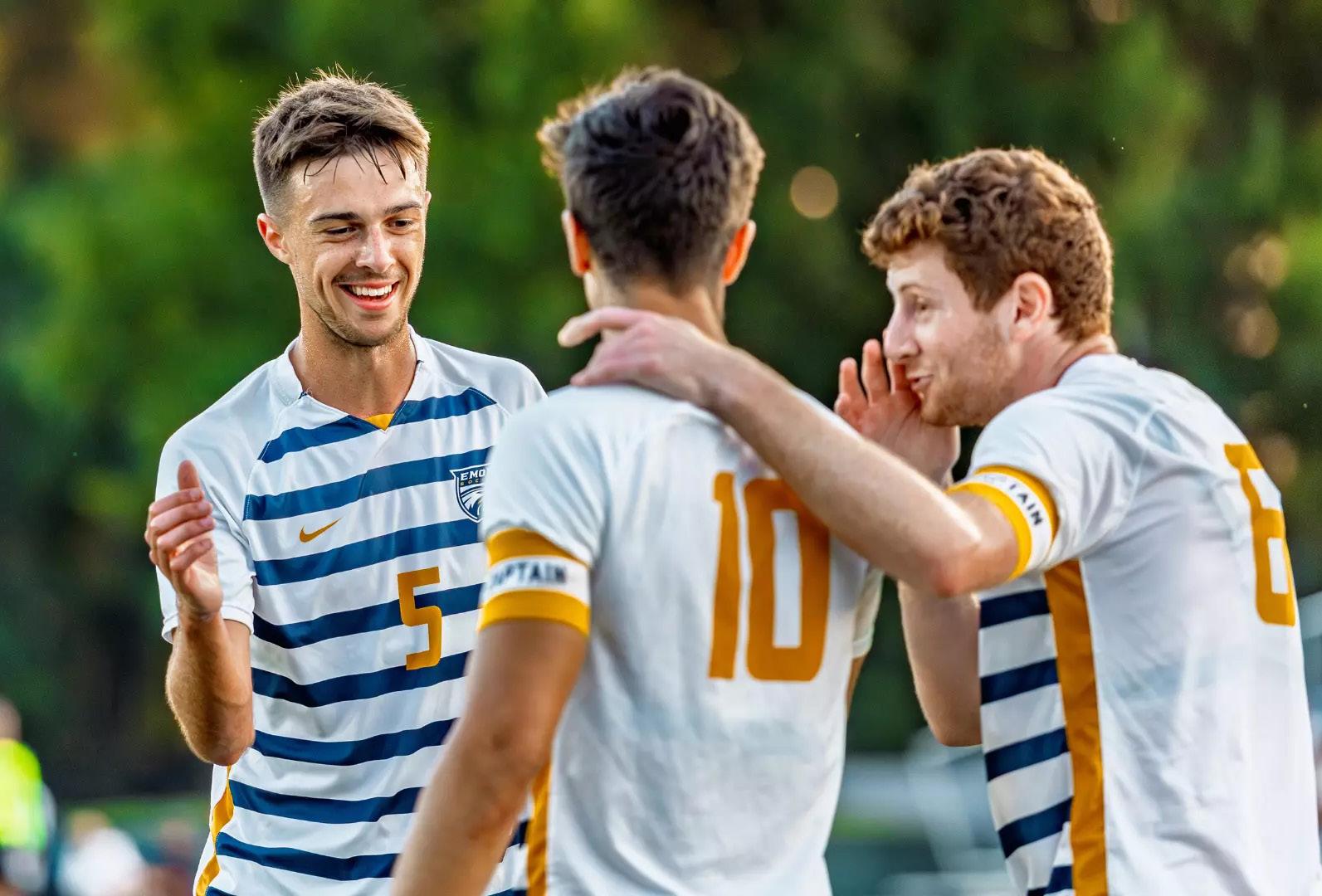
mistakes in the game. It’s about covering each other’s backs so when we get good opportunities, we know we have to capitalize.”
On Saturday, the Eagles did just that, as they jumped out to an early 2-0 lead over Hendrix with goals from Cubeddu and co-captain and senior midfielder Josh Grand. Hendrix quickly countered with a goal of their own before Grand doubled his scoring tally to give the Eagles a 3-1 lead. The Eagles refused to take their foot off the gas en route to a commanding 5-1 victory.
Associate head coach Clayton
Schmitt is in the midst of his ninth year on the men’s soccer staff. The veteran coach said it has been encouraging to see things they emphasize in practice, such as creating more scoring opportunities, turn into positive results during the game.
“That part is, from a coaching perspective, really rewarding and enjoyable,” Schmitt said. “To be able to take what we think will work, put it into training and then seeing the work of that come to fruition and result in us scoring some good goals.”
Schmitt also praised the co-captains for stepping into leadership roles early
this season. He said Grand’s positional flexibility and Steren, as well as cocaptain and junior defender Michael Constant’s contributions, have helped the team maintain the level of success they expect.
“Those in particular have done a really good job of making sure that the standards that we set for ourselves on the field or off the field as a program, and also in the classroom, have helped us keep accountable,” Schmitt said. “They’ve been a huge part to us having that early-season success despite some new pieces coming in.”
While this season’s undefeated
streak into late September ranks amongst their strongest start in the program’s recent history, Steren noted that the team is hungry for more success.
“We want to be the team that people go after,” Steren said. “People say it’s hard to climb the mountain, it’s even harder to stay there and that’s our mentality. We want to get to the top, and then ultimately stay there throughout the season.”
Much of the work to help keep the team at the top of the mountain was put in before the season started, according to Steren. He said the team’s offseason work ethic is a major factor driving their success.
“We trained in the spring at 6 a.m., 6:30, and we lift right after,” Steren said. “That hard work in the spring, and then through the summer, just guys taking it upon themselves playing at a high level. Whether that’s summer league, training, doing everything we can to get right for the season.”
The offseason work is clearly paying off, evidenced by the team’s winning streak. Halpern said a specific possession against Berry College (Ga.) showcased their chemistry as a unit.
“It was a really good sequence of possession where everybody was involved, a lot of movement throughout the whole team, really quick onetwo-touch passing,” Halpern said. “It looked really easy and that was really nice to see. Everyone was on the same page.”
The team will look to continue their stellar start when they face Piedmont University (Ga.) on Sept. 24.
— Contact Ari Mayblum at ari.mayblum@emory.edu
Olivia Rabinowitz setting standard during stellar season
By Theo NorkiN Contributing Writer
Heading into the first roundrobin games of University Athletic Association (UAA) play, a game format where every team plays against one another in one weekend, the Emory University volleyball team currently holds an 8-2 record, which has earned the team an eighth-place national ranking. A huge reason for the Eagles’ recent success has been star senior setter Olivia Rabinowitz.
Since her freshman year in 2022, Rabinowitz has been a key player for the Eagles. She averaged 9.46 assists per set in her first season, finishing second in the UAA in that category. As Rabinowitz gained more experience, her game improved, and she set career highs in matches played, 32, and total digs, 195, during her junior season. Rabinowitz’s stellar performance led her to make the All-UAA Second Team last year.
Rabinowitz’s assist totals have added up over the years. In 331 sets played, she has recorded 2,020 assists and has led the team in total assists in all four of her seasons. She also recorded a career-high 49 assists earlier this year in a five-set victory against Claremont-Mudd-Scripps (Calif.). While her individual numbers are undoubtedly impressive, Rabinowitz credited her teammates for her statistical success.
“We have opponents that have very tough serves,” Rabinowitz said. “So for
the passers to be able to give me a pass and for the hitters to trust me that I could give them a ball where they can swing and terminate the rally, it’s just a really awesome feeling.”
Senior outside hitter and defensive specialist Kate LaRocco has shared the court with Rabinowitz for the past four years. She praised Rabinowitz’s consistency and awareness as a setter.
“I always know what to expect,” LaRocco said. “I’m not going to get [a ball] that’s too far or too short.”
In addition to her teammates, Rabinowitz’s coaches praised both her physical and mental sides of the game. Head coach Brianna Jones added that Rabinowitz’s ability to be consistent has led to much of her success.
“She’s by far one of the most consistent people I’ve ever met in my life off the court and on the court, so you know what you’re gonna get from her,” Jones said. “When you have someone that’s consistent as your teammate, it’s very easy to trust them, so she has the trust and respect of all of her teammates.”
While Rabinowitz has mastered the art of setting, she is still seeking ways to improve her game. She said she wants to get better at looking at the other side of the net to set up her hitters with the best opportunities to score.
“Looking at matchups and figuring out if the block is following your outside hitter and they have four hands up,” Rabinowitz said. “Or you can hit the ball in the other direction and sur-
prising the other side, so that the hitter has only two hands up, giving the hitter the best opportunity based on what the other side is doing.”
Jones, who has been with Rabinowitz for the last three seasons, believes Rabinowitz has grown tremendously since her freshman season. According to Jones, Rabinowitz’s confidence has increased and said that the star setter has embraced her role as one of the team’s leaders.
“She’s a big leader by example,” Jones said. “She’s not going to say too much, but you know what you’re going to get from her. ... She’s going to work hard and work to improve or work to make the person next to her better every ball.”
Since Rabinowitz joined the team in 2022, the Eagles have won two UAA championships and made it to the NCAA Elite Eight last season. This season, she said the Eagles are mentally prepared to win a national championship after last season’s run proved they belong on the national stage.
“We’re definitely motivated,” Rabinowitz said. “Especially since we made it to the Elite Eight last year, we saw a glimpse of what it’s like and losing in that first round of the Elite Eight made us even more motivated, and it showed us that we deserve to be there.”
Pregame routines have been crucial to building the Eagles’ strong team chemistry and Rabinowitz’s success. Rabinowitz’s routine starts with her usual order of Starbucks, which she always gets with senior middle hitter
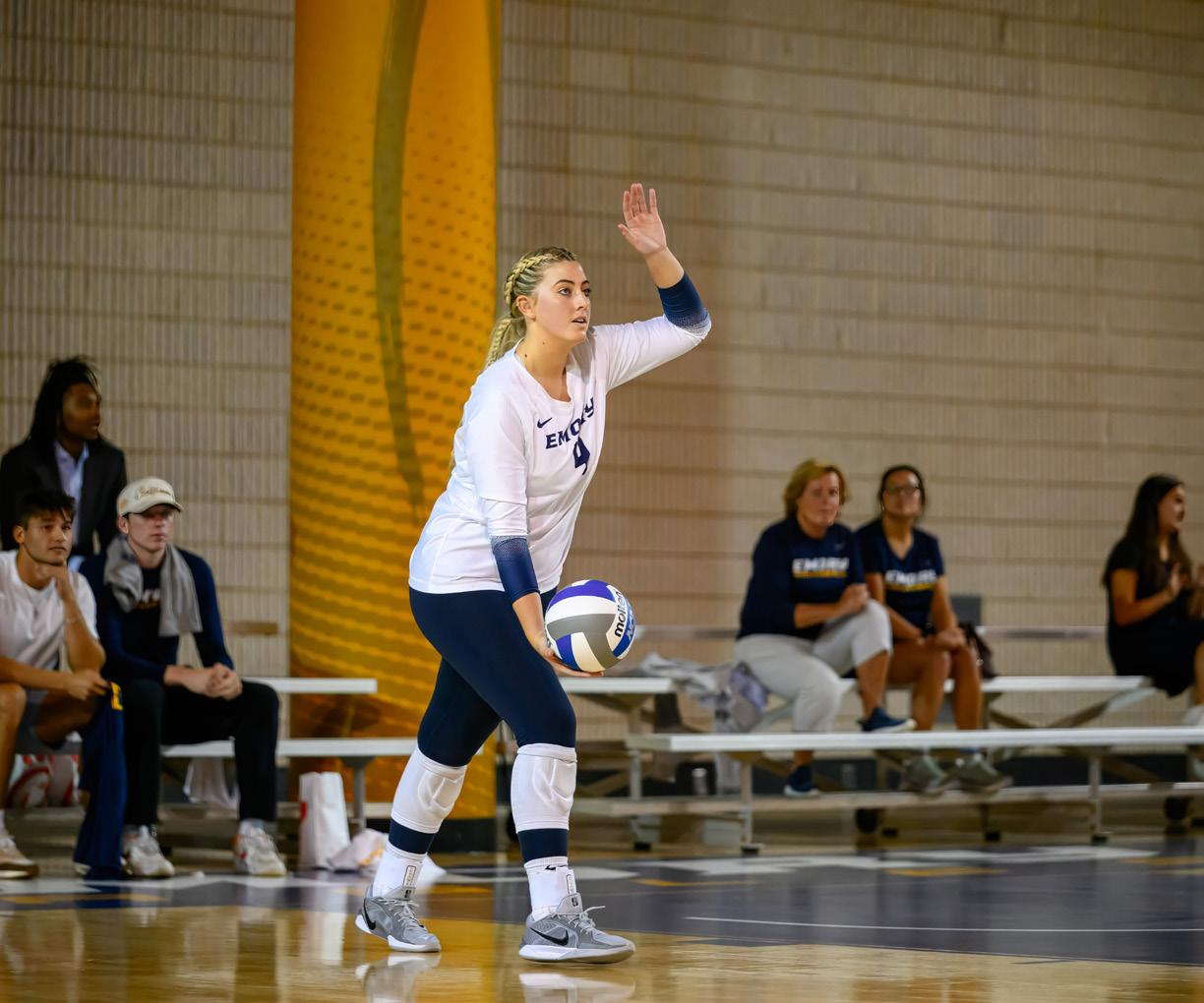
Sophie Zerrouki. Before each game, the Eagles have a 20-minute dance party in the locker room. Following that, they calm down to visualize the game and practice deep breathing exercises. Rabinowitz greatly credits this routine for allowing her to play to her best level.
“You can visualize the good, the bad, and how you’re going to overcome that,” Rabinowitz said. “That’s very important for me before each game, and also just focusing on deep breaths.”
While this is Rabinowitz’s final season playing volleyball for Emory, she said the memorable moments and the friendships she created here will last forever.
“I literally just go home during break and rave about how I’ve never been on a team where we love each other so much,” Rabinowitz said. “I’m so grateful for all the girls that I’ve been surrounded by.”
— Contact Theo Norkin at theo.norkin@emory.edu
Volleyball sweeps Covenant, building momentum into conference play
By SoNiA liew Contributing Writer
The Emory University volleyball team added another win to their record on Sept. 20 with a 3-0 sweep over Covenant College (Ga.). The team has come out strong this season with an 8-2 record in nonconference play, following last year’s impressive season in which they claimed the University Athletic Association (UAA) title and advanced to the quarterfinals in the NCAA tournament.
The Eagles started the game against Covenant strong, with senior middle hitters Eliane Silberman and Maggie Regan contributing kills that led to an early 8-1 run for Emory. Covenant attempted to take control of the game and came within a fivepoint deficit, but senior outside hitters and defensive specialists Kate LaRocco and Kaya Monrose added kills that led to a 7-2 run to dominate the first set 25-15.
In the second set, service aces from LaRocco and kills from Monrose led to a 25-13 score. Emory also took the third set, with service aces from LaRocco and freshman setter Carolina Ufret helping lead the team to victory. LaRocco said capitalizing on serves was important to winning the game, especially because the team had lost serving opportunities in past matches.
“We missed a lot of serves in our other games,” LaRocco said. “This game really focused on our serves … it was a big ace game. And so in those moments, we’re told to take our time and take a deep breath
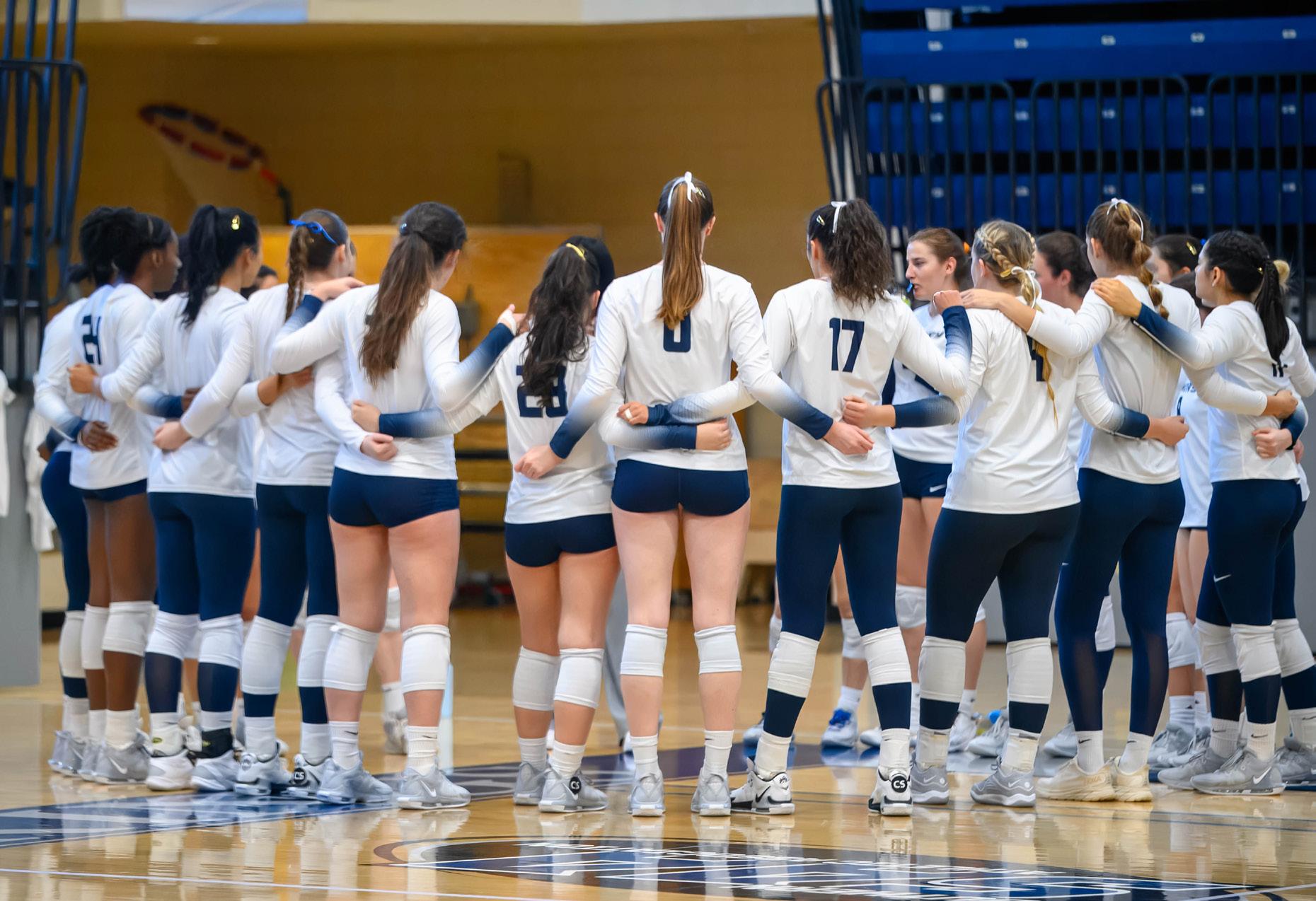
before we serve to refocus and collect ourselves.”
Ufret played a contributing role in the team’s win, totaling four service aces and 14 assists. Even though it is her first season, Ufret has stepped into the rotation alongside senior setter Olivia Rabinowitz, who leads the team in assists this season and had 15 assists in this contest. Head coach Brianna Jones, who entered her third season leading the team, praised Ufret for making an impact early in her college career.
The Eagles’ mix of experience and
new talent has fueled their early success. Though they have had to adjust after losing last year’s seniors, the team chemistry remains a defining factor, which LaRocco said played a key part in the victory.
“We’re still trying to figure things out, but one of our main goals right now is having unwavering confidence in ourselves, in our teammates, and we really showed that yesterday,” LaRocco said. “We never let down throughout the game. We just played our game and trusted each other and did our jobs.”
Despite the loss of their defensive specialist and libero Deborah Hong, who graduated after last season, the Eagles’ defense remains solid. Jones said senior defensive specialist Caroline Coyle is filling the defensive leadership role at that position this season.
“Coyle has been the most consistent for us,” Jones said. “She’s been doing great things and providing great opportunities for our offense to score by her digs, and then also her service reception has been absolutely fantastic.”
Ufret said that the team’s defense against Covenant was very consistent and helped the team play as a unit, which she said they emphasized leading up to the game.
“One of our main goals right now is having unwavering confidence in ourselves.”
— K ate LaRocco
“We were very cohesive and consistent in every part of our game,” Ufret said. “That was something we came in knowing that we needed to do was play together and be one unit.”
The team will start their conference play next weekend in the first UAA round-robin matches, where they will face No. 25 Carnegie Mellon University (Pa.) and Brandeis University (Mass.) on Sept. 27 and Case Western Reserve University (Ohio) on Sept. 28. LaRocco said she believes the team can make a deep run this season, but that they are emphasizing a steady approach to start conference play.
“I see us definitely going very far,” Larocco said. “This weekend, we’re just going to focus on the teams that we’re playing in UAA. … We’re just going to focus on one game, one point at a time, and then after that, we move on to the next game.” w — Contact Sonia Liew at sonia.liew@emory.edu
Josh Grand captains successful men’s soccer season
By Alex wAryN Staff Writer
All-UAA First Team honoree and senior midfielder Josh Grand has become an anchor of the Emory men’s soccer team. After helping lead the Eagles to conference play last season, finishing with a 5-1-1 conference record, their best in University Athletic Association (UAA) play since 2008, Grand is now leading the team as co-captain, starting the season off strong with an undefeated 8-0 record.
Last season’s success was nothing
new for Grand. As a freshman, Grand tied for the second-most points on the team with nine, including his four goals that season, and tied for third on the team in shots on goal with 13.
In his second season with the Eagles, Grand started in all 17 games he played in and was again top three in goals, points and shots on goal. He also scored the first of three goals against Brevard College (N.C.) in the team’s NCAA tournament first-round victory that year. He made the AllUAA Second Team in both the 2022 and 2023 seasons.
Last year, Grand led the team with 10 assists, five of which were on game winners, and played 1,271 minutes — the most of any player on the team. As team co-captain, Grand is a leader both on and off the field. Senior goalkeeper Keirnan Skelly said Grand holds the team to a high standard and keeps them focused on their collective goals.
“[Grand] is a great leader. That’s why we made him team captain,” Skelly said. “As a goalkeeper, he makes the job a lot easier when he is constantly communicating, and working hard … and holding the entire team to
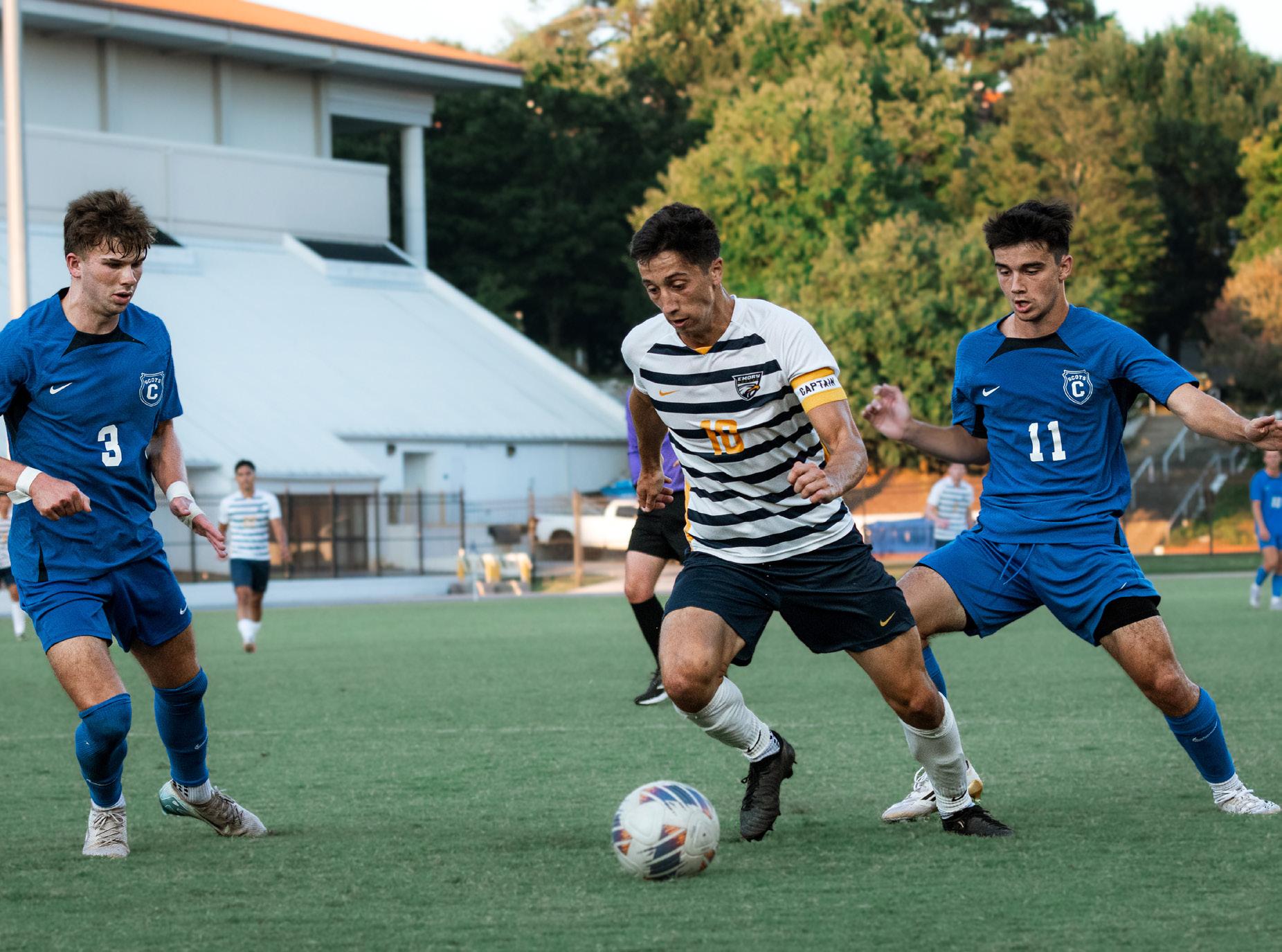
a higher standard in what we want to accomplish.”
“[Grand] is a great leader. That’s why we made him team captian.”
— Keirnan Skelly
Graduate midfielder Jack Burgess said Grand inspires the rest of the team through a trickle-down effect.
“He’s obviously a great player, so that drives the team forward when you see your captain doing as well as he’s done,” Burgess said. “He’s a great personality to have around and pushes the team as a unit.”
At almost the midpoint of the season, Grand leads the team in both goals and assists. During the team’s most recent match on Sept. 20 against Hendrix College (Ark.), Grand led the team with two goals and assisted on another. While Grand has certainly earned his awards with his performances on the field, his team-oriented approach and prioritization of group accomplishments over his own make him a true leader.
“At the end of the day, the only thing that really matters is that the team was able to win the conference championship again,” Grand said. “In spite of all individual accolades, what it really boils down to is how the team performs. And that’s also why the beginning of this season has been so rewarding, not because of any individual stats, but because the team has performed so well.”
Grand’s work ethic is present in both an athletic and academic setting, as he is double-majoring in phi-
losophy, politics and law and international studies. Being a studentathlete is no easy feat, but Grand said he has learned how to balance the demands over the years.
“My freshman year, it was a bit of a wake-up call just because you’re now in your own world,” Grand said. “Just learning how to balance it all and make the most of every minute while still remaining sane has been an important skill.”
As his college career nears its end, Grand said his goal for this season is to do whatever it takes to be a good captain and help his team reach the NCAA championship.
“We’ve set our eyes on the third consecutive conference championship, but looking even bigger, we want to be able to contend for the national championship,” Grand said. “Playing my role, whether that’s scoring the goals or getting the assists or just being a good captain, whatever it takes to lift others up and hopefully get a national championship.”
“What it really boils down to is how the team performs.”
— Josh Grand
While Grand will graduate in the spring, Burgess said he will continue to impact the program and inspire his teammates for years to come.
“He’s already made his mark quite well for the previous three years he’s been here,” Burgess said. “I don’t think Emory will forget him very easily.”
— Contact Alex Waryn at alex.waryn@emory.edu


3 MONTHS FREE



